So you’ve decided to treat yourself to a trip to McDonald’s. You’ve been dreaming of a juicy burger, craving their salty fries, and counting down the minutes to when you can get your hands on a McFlurry for dessert. But, when you finally make it there, you take a look at their enormous menu and find yourself overwhelmed by the amount of options. This may be especially difficult if you’re trying to stick to a somewhat “healthy” meal for yourself, or at least one that won’t completely derail your health goals. If this is the case, you’ll want to read to learn more about the nutrition found in the McDonald’s menu, to prepare yourself for what you’re getting into the next time you find yourself drawn to the Golden Arches.
Finding a healthier choice for yourself at McDonald’s is certainly possible, but it’s important to be aware of the fact that fast food by nature is more likely to contain certain unhealthy characteristics. Things like high levels of fat and saturated fat, calories, sodium, and added sugar make this ultra-processed food particularly harmful to your health if consumed consistently. In fact, some research has shown that consumption of fast food may increase risk of things like diabetes, heart disease, obesity, and even certain cancers.
With this in mind, knowing which menu options have lower levels of fat, calories, sodium, and sugar can help you make healthier choices next time you’re craving some fast food. For more on the McDonald’s menu nutrition information, read on to learn about what dietitians say are the best and worst items available. Then, make sure to check out the 21 Best Low-Sodium Fast-Food Orders.
The Worst Breakfast Menu Items at McDonald’s
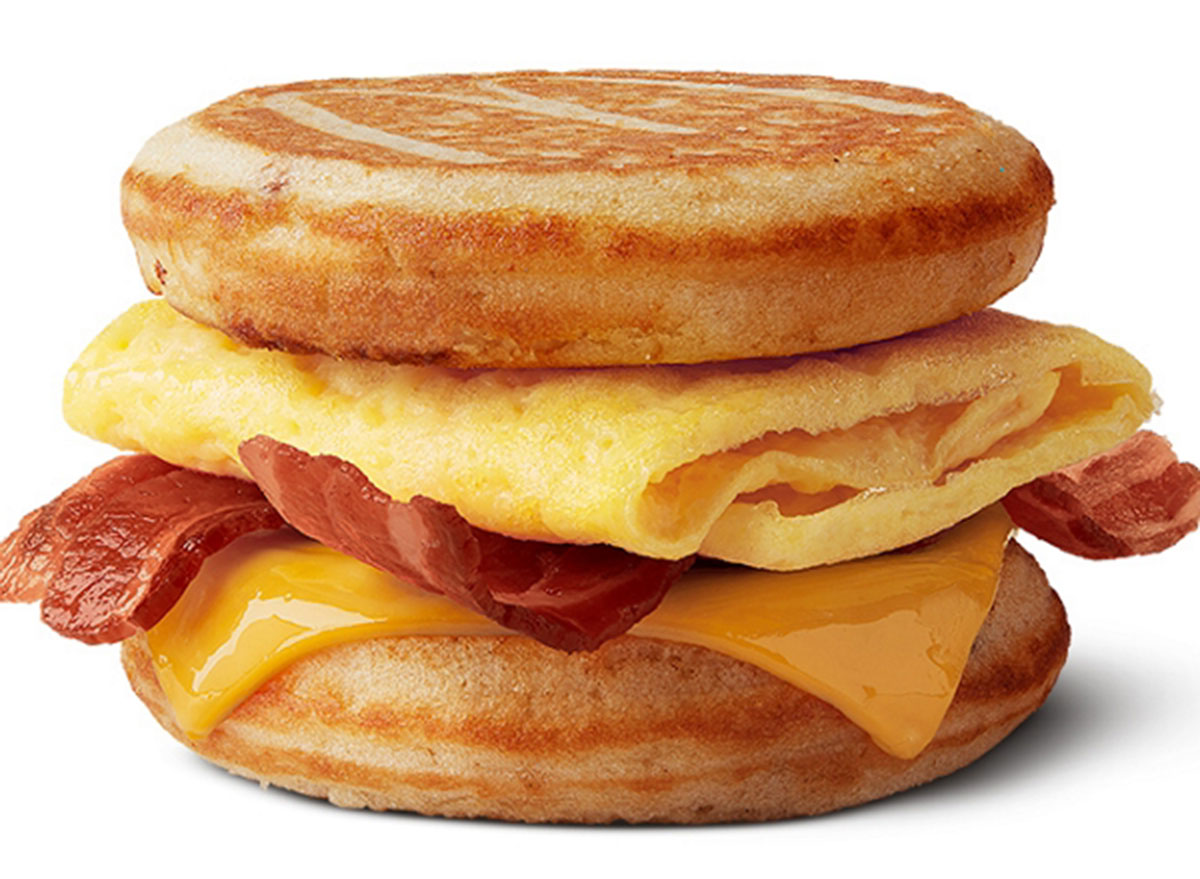
Per serving: 430 calories, 21 g fat (9 g saturated fat, 0 g trans fat), 1,230 mg sodium, 44 g carbs (2 g fiber, 15 g sugar), 17 g protein
According to Amy Goodson, MS, RD, CSSD, LD author of The Sports Nutrition Playbook and member of our Medical Expert Board, the Bacon, Egg, & Cheese McGriddle is one of the worst breakfast items on the McDonald’s menu. “With almost half of your daily allowance for saturated fat and over half the sodium, this breakfast can spell trouble for many Americans. If you’re going to opt for the bacon McGriddle, try ordering with no added cheese to cut down on calories, saturated fat, and sodium.”
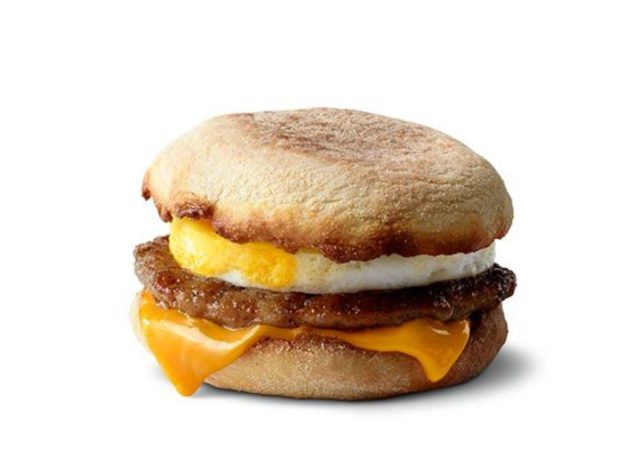
Per serving: 480 calories, 31 g fat (12 g saturated fat, 0.5 g trans fat), 830 mg sodium, 30 g carbs (2 g fiber, 2 g sugar), 20 g protein
“At 20 grams of protein, this Sausage McMuffin With Egg is one of the highest protein breakfast options at McDonalds,” says Goodson. “However, it also boasts almost two-thirds of your daily value for saturated fat and 480 calories, so remember to consume in moderation.” Also, the amount of sodium in this sandwich isn’t ideal, but compared to some of the other breakfast sandwiches at McDonald’s, this one isn’t as bad.
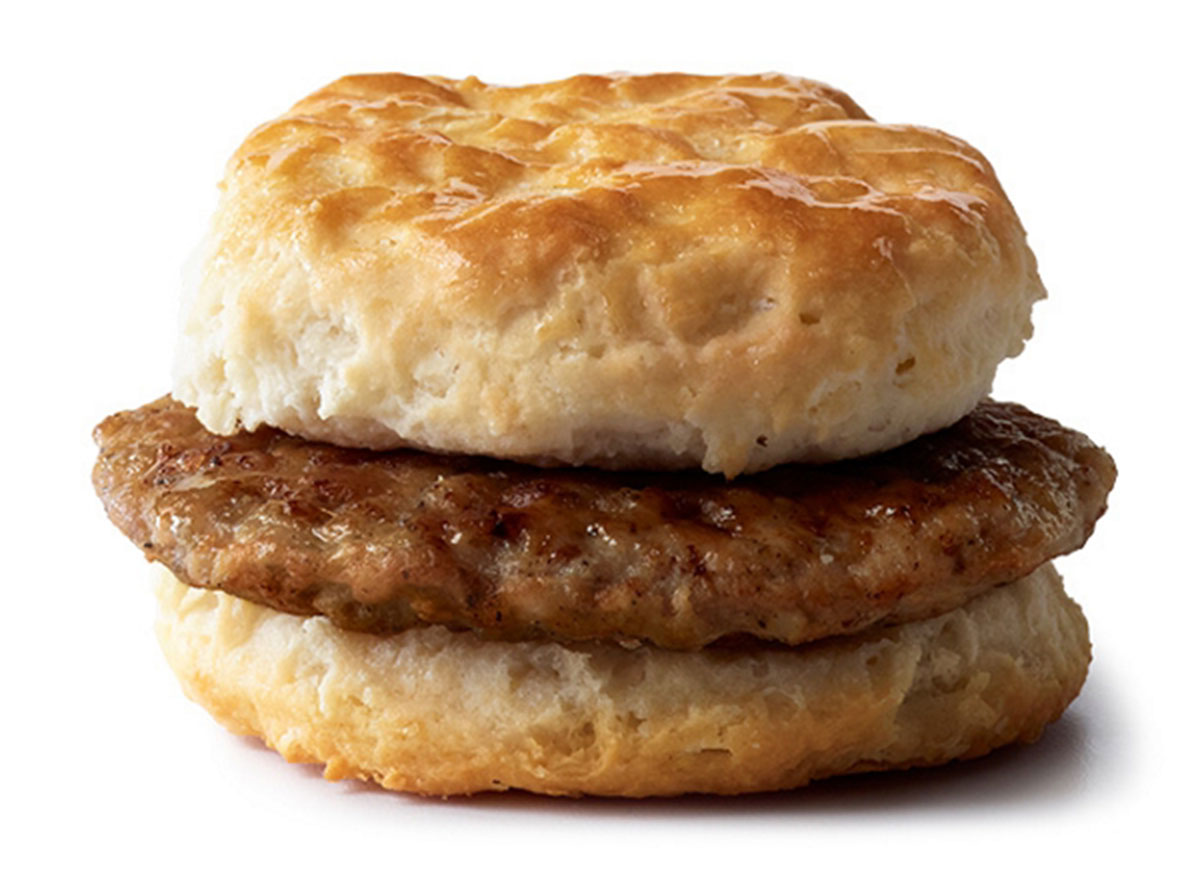
Per serving: 460 calories, 30 g fat (13 g saturated fat, 0 g trans fat), 1,090 mg sodium, 37 g carbs (2 g fiber, 2 g sugar), 11 g protein
Goodson says “the sausage biscuit is higher in saturated fat than protein, and provides almost half your daily value of sodium,” which is what lands this sandwich on the list of worst breakfast options. “Biscuits will typically always be higher in calories than English muffins,” she adds. So, if you’re craving sausage, try something like the Sausage McMuffin instead.
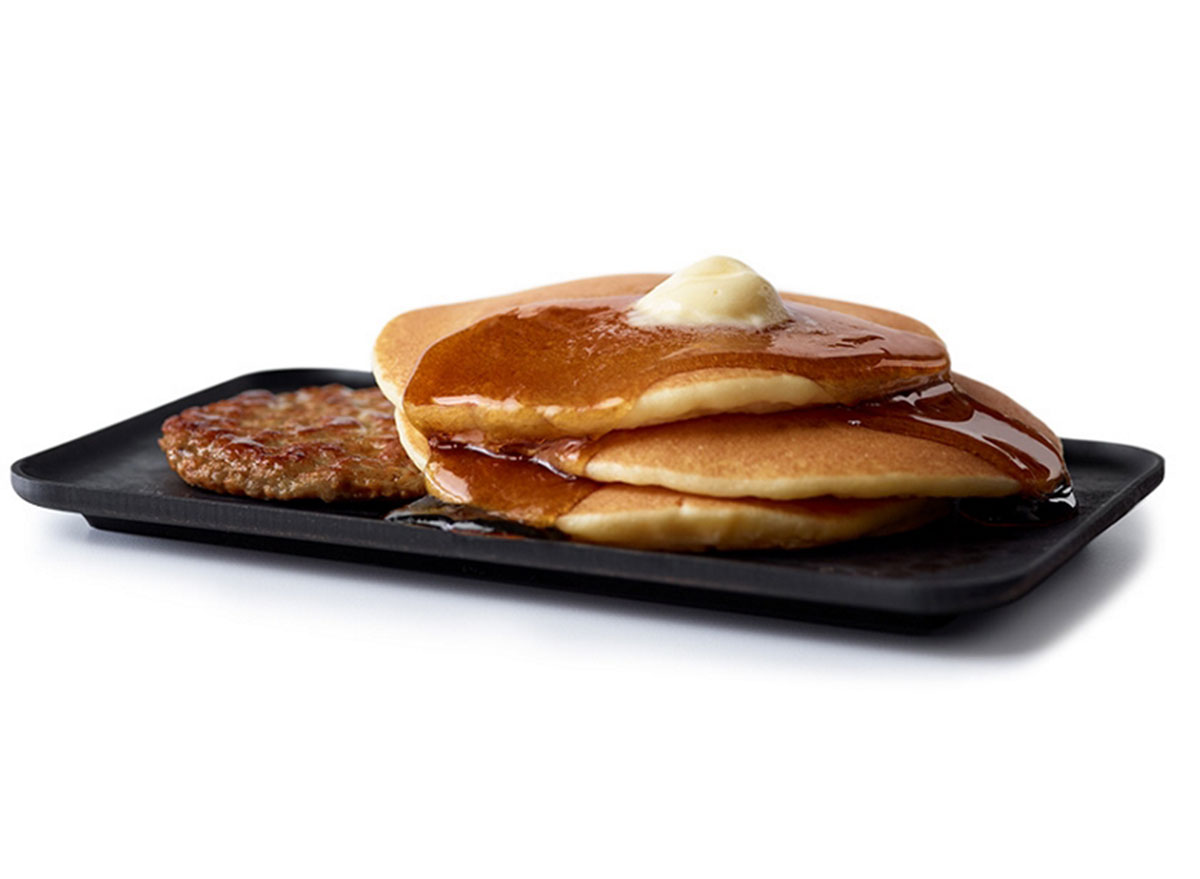
Per 3 hotcakes, syrup, sausage, and butter: 770 calories, 33 g fat (13 g saturated fat, 0 g trans fat), 830 mg sodium, 102 g carbs (2 g fiber, 46 g sugar), 15 g protein
The Hotcakes and Sausage breakfast at McDonald’s has 13 grams of saturated fat, which, according to the American Heart Association, is your entire daily recommended amount. On top of the higher levels of saturated fat, you’ll also have to deal with the 46 grams of sugar and only 15 grams of protein, which could leave you feeling less satisfied and hungrier quickly after.
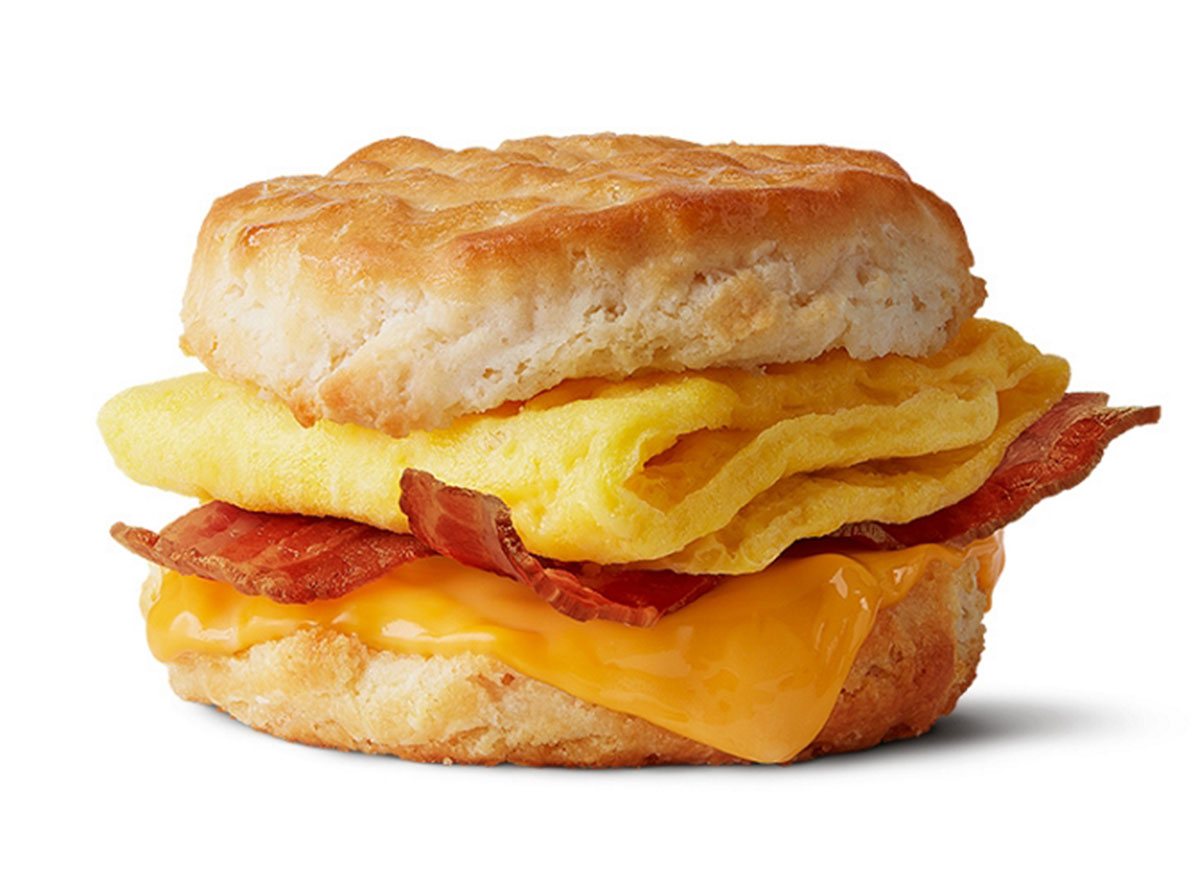
Per serving: 460 calories, 26 g fat (13 g saturated fat, 0 g trans fat), 1,330 mg sodium, 39 g carbs (2 g fiber, 3 g sugar), 17 g protein
Speaking of saturated fat, the Bacon, Egg & Cheese Biscuit also contains your entire daily recommended amount. According to Goodson, although this biscuit “has less total fat and more protein than its sausage counterpart, it is [also] the third-highest sodium breakfast item, providing over half of the daily recommended amount in one meal.”
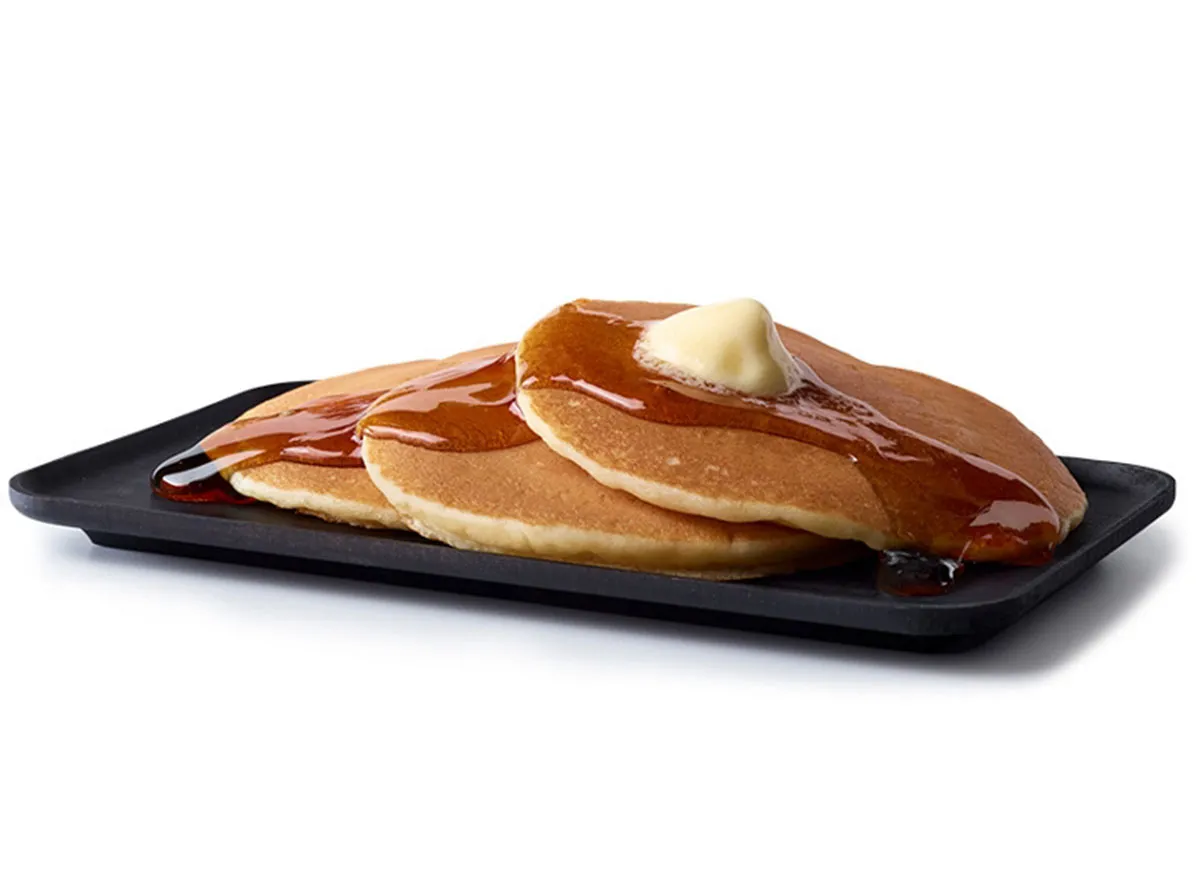
Per 3 hotcakes, syrup, and butter: 580 calories, 9 g fat (6 g saturated fat, 0 g trans fat), 550 mg sodium, 101 g carbs (2 g fiber, 45 g sugar), 9 g protein
Even though the McDonald’s Hotcakes have less saturated fat than some of the other breakfast options, the 101 grams of carbohydrates, 45 grams of sugar, and only 9 grams of protein makes for an imbalanced meal that isn’t going to leave you feeling full or satiated.
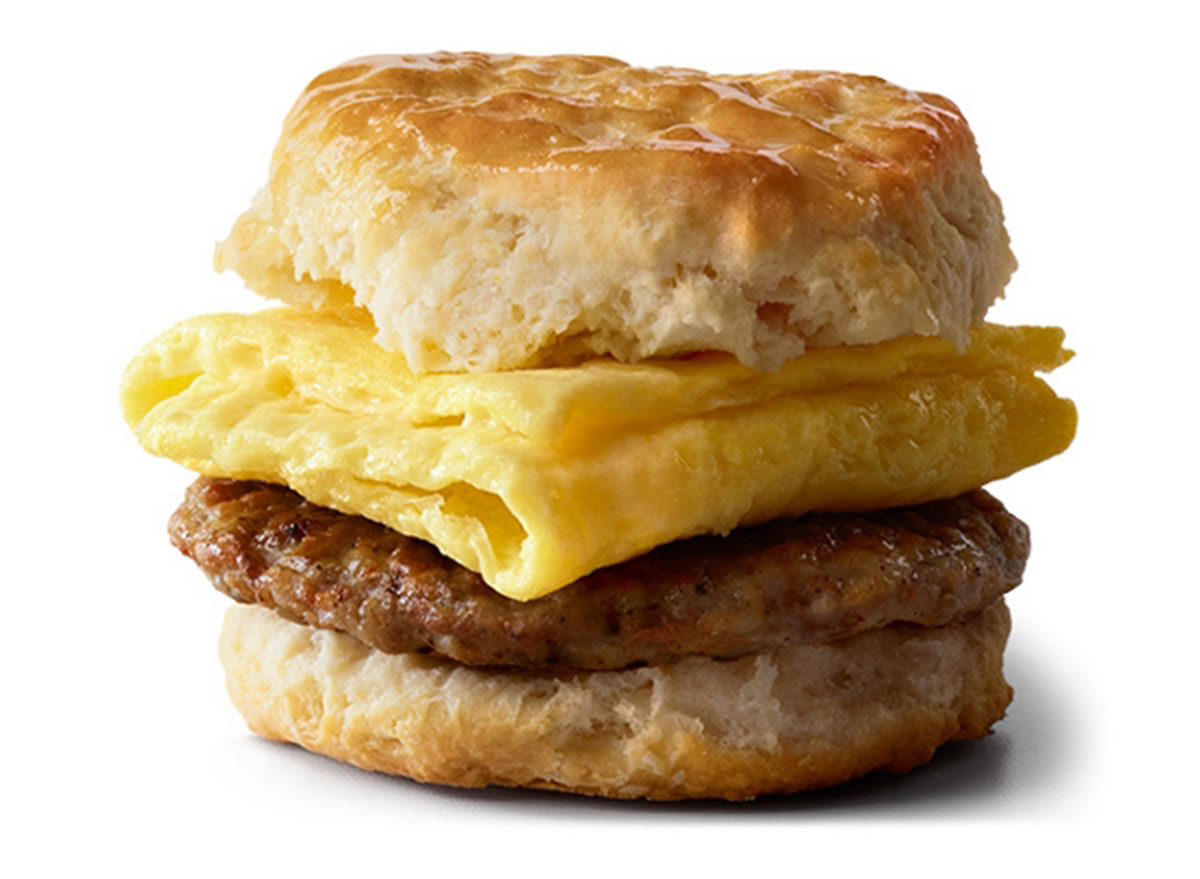
Per serving: 530 calories, 35 g fat (15 g saturated fat, 0 g trans fat), 1,190 mg sodium, 38 g carbs (2 g fiber, 3 g sugar), 17 g protein
Goodson says that the combination of sausage, egg, and biscuit leaves the calories, saturated fat, and sodium way too high in this meal. “If you’re craving eggs and sausage, nix the biscuit or opt for the McMuffin to cut down on sodium, saturated fat, and overall calories.”
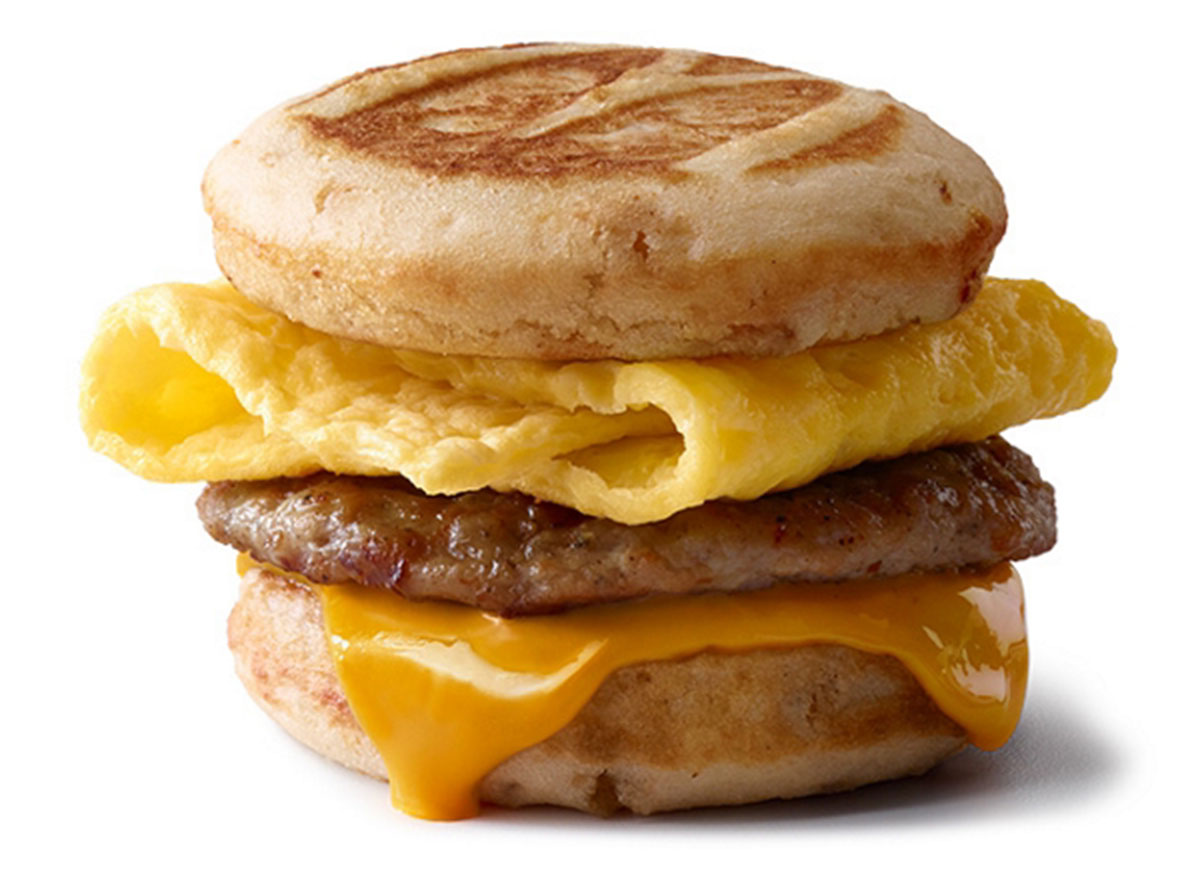
Per serving: 550 calories, 33 g fat (13 g saturated fat, 0 g trans fat), 1,290 mg sodium, 45 g carbs (2 g fiber, 15 g sugar), 19 g protein
“Combining the classic McGriddle with sausage, egg, and cheese packs on the calories, saturated fats, sodium, and even added sugars,” says Goodson. “For example, this breakfast provides a quarter of your daily allowance for added sugars, two-thirds for saturated fat, and over half for sodium. Not to mention, it clocks in at 550 calories.” Because of this, it may be best to leave this one behind.
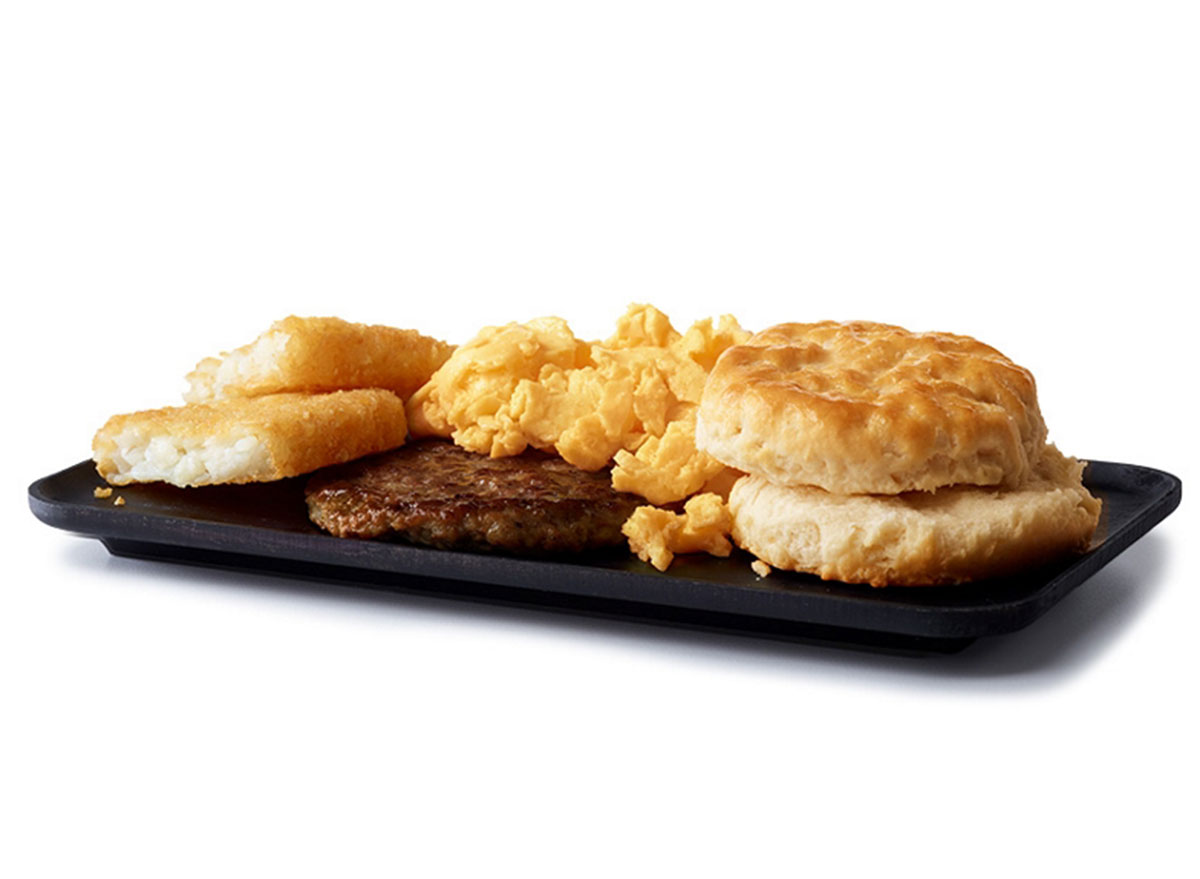
Per biscuit, scrambled eggs, sausage, & hashbrowns: 760 calories, 48 g fat (18 g saturated fat, 0 g trans fat), 1,530 mg sodium, 57 g carbs (3 g fiber, 3 g sugar), 26 g protein
Eating a big, nutrient-dense breakfast can be a great way to start your day, but even though this meal is “big,” it certainly misses the mark on nutrients. “At almost 800 calories, this breakfast platter is a quick way to overspend on your calorie budget for the day, with two-thirds of your daily allowance for sodium and almost all of your recommended daily intake for saturated fat,” says Goodson. “Nix the biscuit or hash browns to cut down on overall calories and fat.”
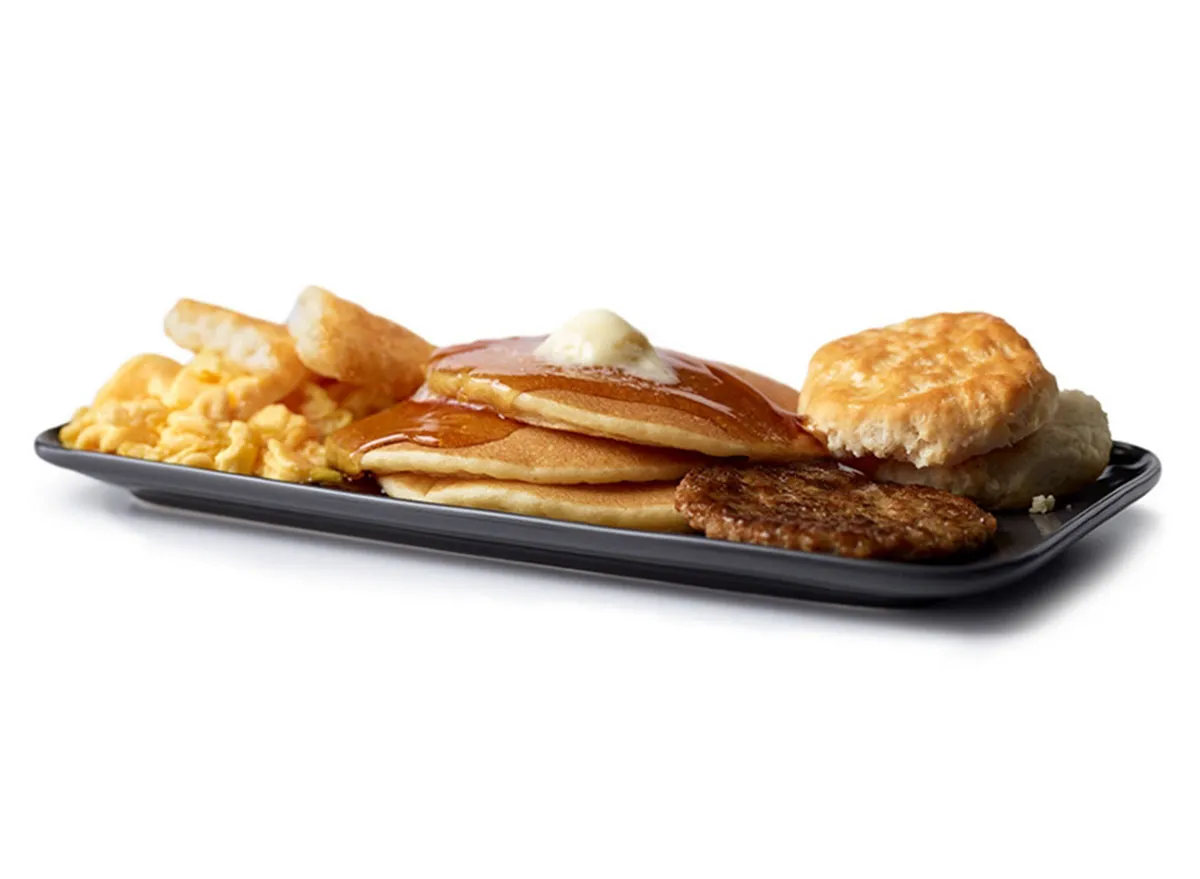
Per hotcakes, biscuit, scrambled eggs, sausage & hashbrowns: 1,340 calories, 63 g fat (24 g saturated fat, 0.5 g trans fat), 2,070 mg sodium, 158 g carbs (5 g fiber, 48 g sugar), 36 g protein
And just when you think it can’t get worse—it does. “The Big Breakfast with Hotcakes provides more than your daily value for saturated fat and almost your daily value for sodium, which can be a major concern for those watching their blood pressure or trying to reduce their risk of heart disease,” says Goodson. “Not to mention, it provides almost your daily amount of added sugars.”
The Best Breakfast Menu Items at McDonald’s
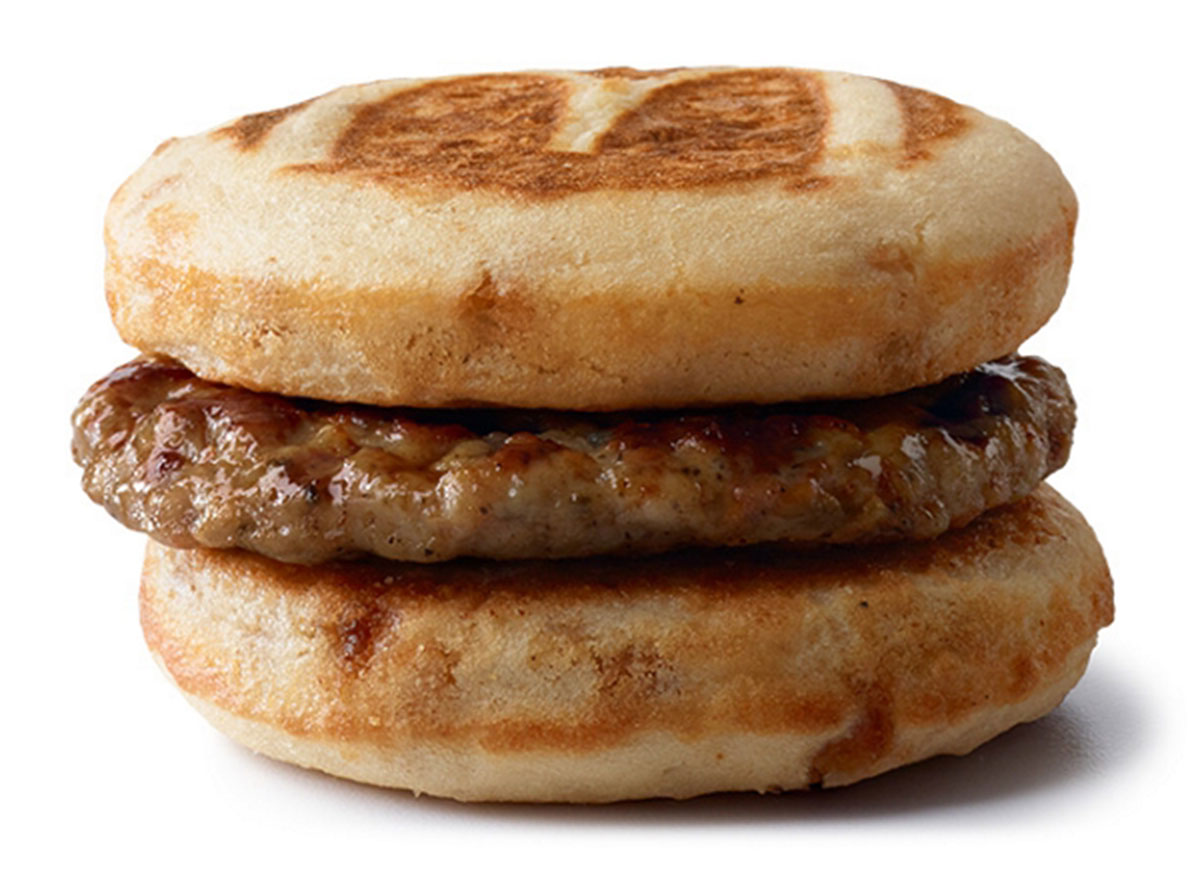
Per serving: 430 calories, 24 g fat (9 g saturated fat, 0 g trans fat), 990 mg sodium, 41 g carbs (2 g fiber, 14 g sugar), 11 g protein
It’s hard to find super healthy fast food breakfasts, but there are some choices that can harm you less than others. “The Sausage McGriddle keeps it simple with just sausage and cakes, and can be an option to satisfy your sweet-and-savory cravings without as much added sodium and saturated fats as the other McGriddle menu options,” says Goodson.
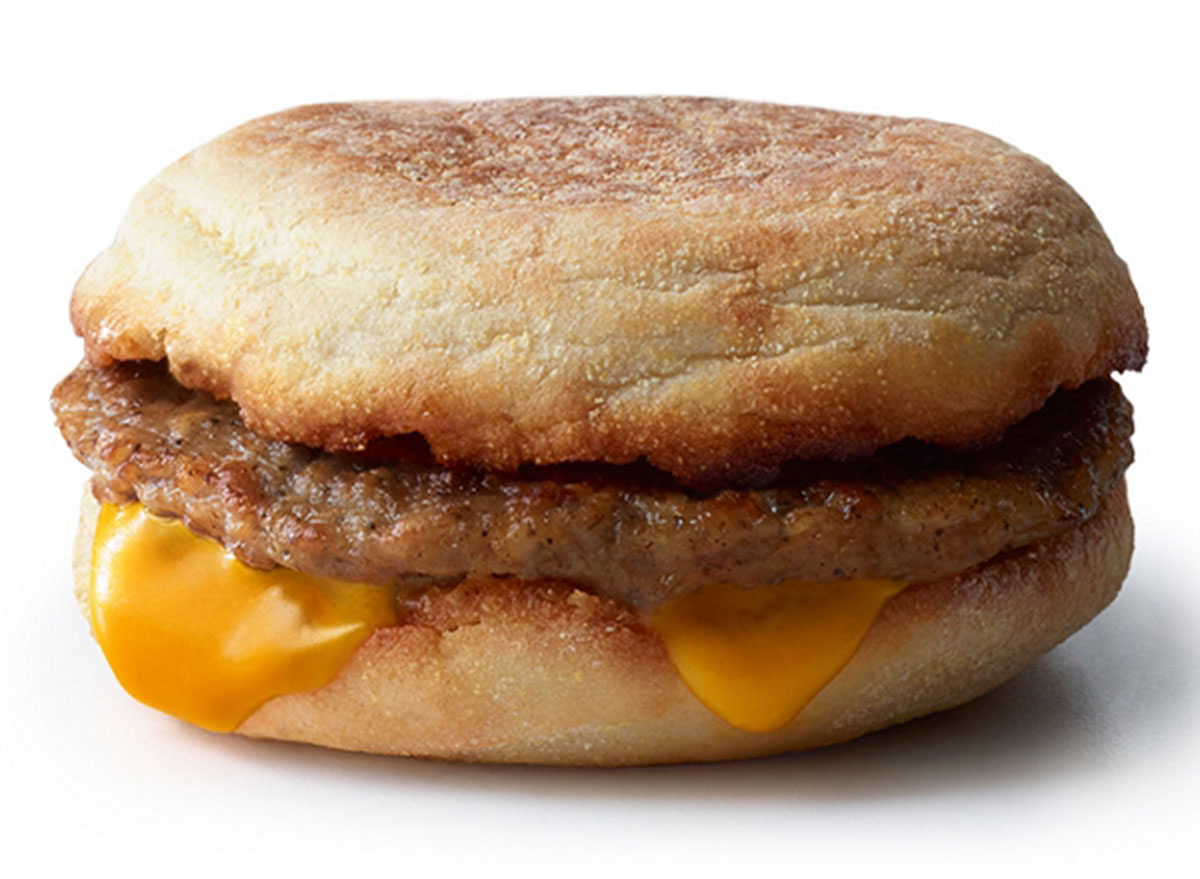
Per serving: 400 calories, 26 g fat (10 g saturated fat, 0.5 g trans fat), 760 mg sodium, 29 g carbs (2 g fiber, 2 g sugar), 14 g protein
The sodium in the Sausage McMuffin is lower than many of the other sandwiches on the McDonald’s menu, making it a bit easier on the heart health. According to Goodson, “This breakfast classic can be an option to satisfy cravings while providing you with high-quality protein paired with carbohydrates to provide you with energy to tackle your morning routine.”
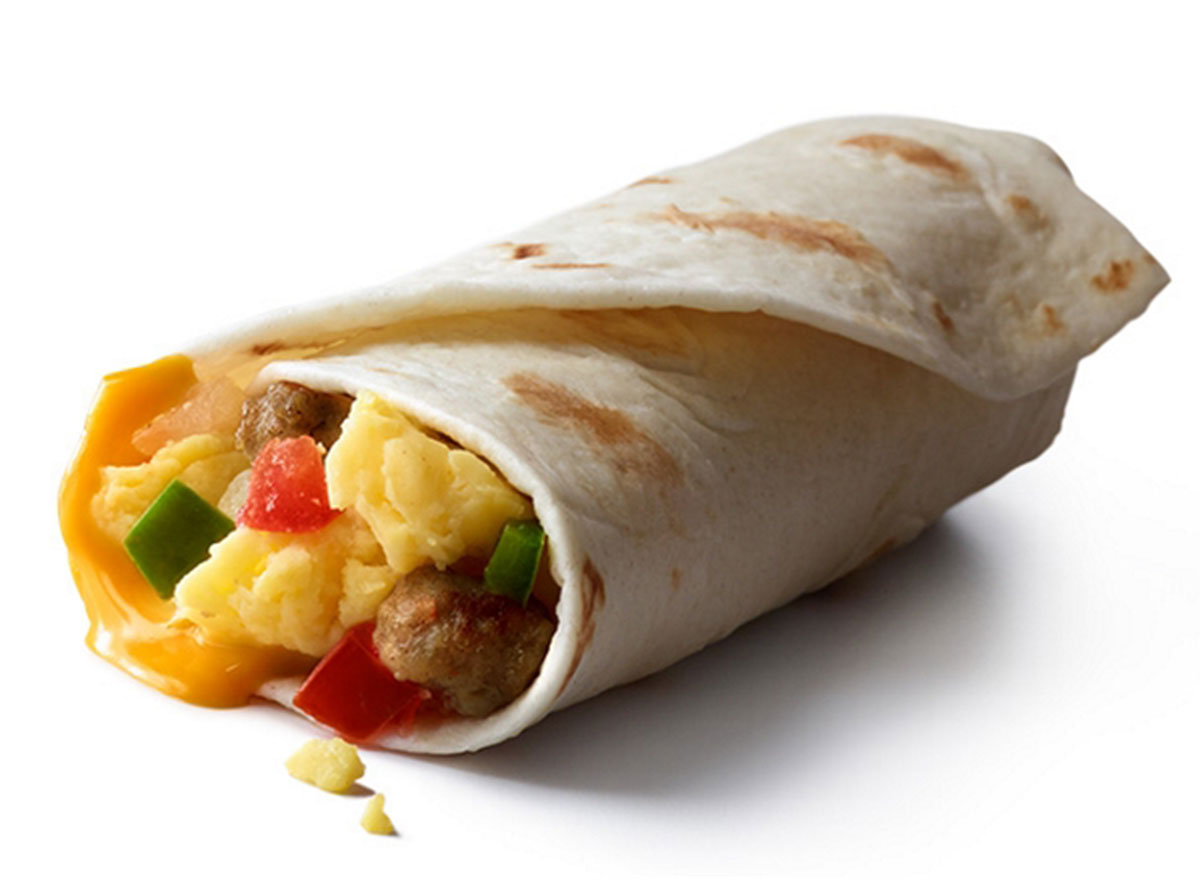
Per serving: 310 calories, 17 g fat (7 g saturated fat, 0 g trans fat), 800 mg sodium, 25 g carbs (1 g fiber, 2 g sugar), 13 g protein
“McDonald’s take on a breakfast burrito includes peppers, onions, eggs, sausage, and cheese wrapped in a soft tortilla,” says Goodson. “Not only are you getting some added nutrients from the veggies, but you’re also getting 13 grams of protein at only 310 calories.” So, if you’re looking for a breakfast option that provides some nutrients and keeps the calories fairly low, this can be a helpful option.
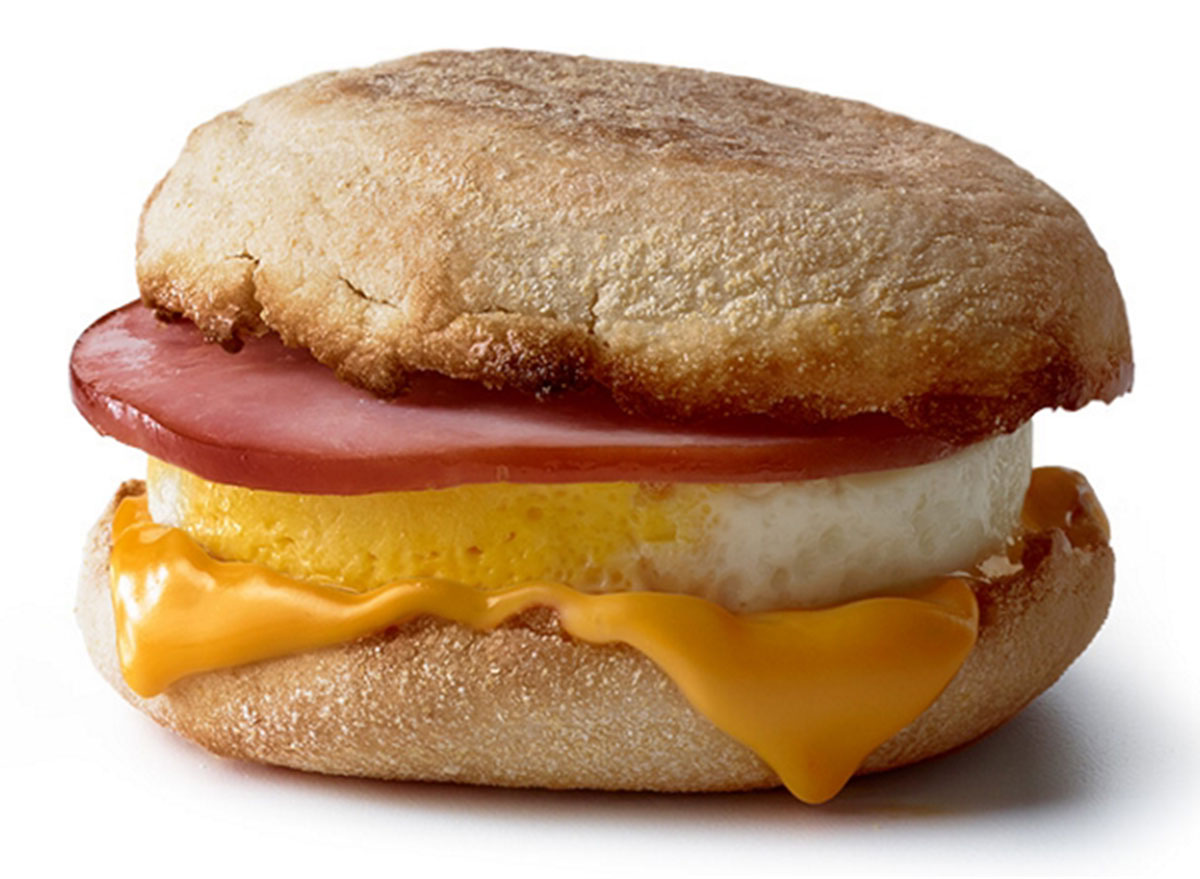
Per serving: 310 calories, 13 g fat (6 g saturated fat), 770 mg sodium, 30 g carbs (2 g fiber, 3 g sugar), 17 g protein
“The Egg McMuffin is a classic, and for good reason,” says Goodson. “It provides you with a whopping 17 grams of high-quality protein, and at only 310 calories, it won’t break your calorie bank before lunch.”
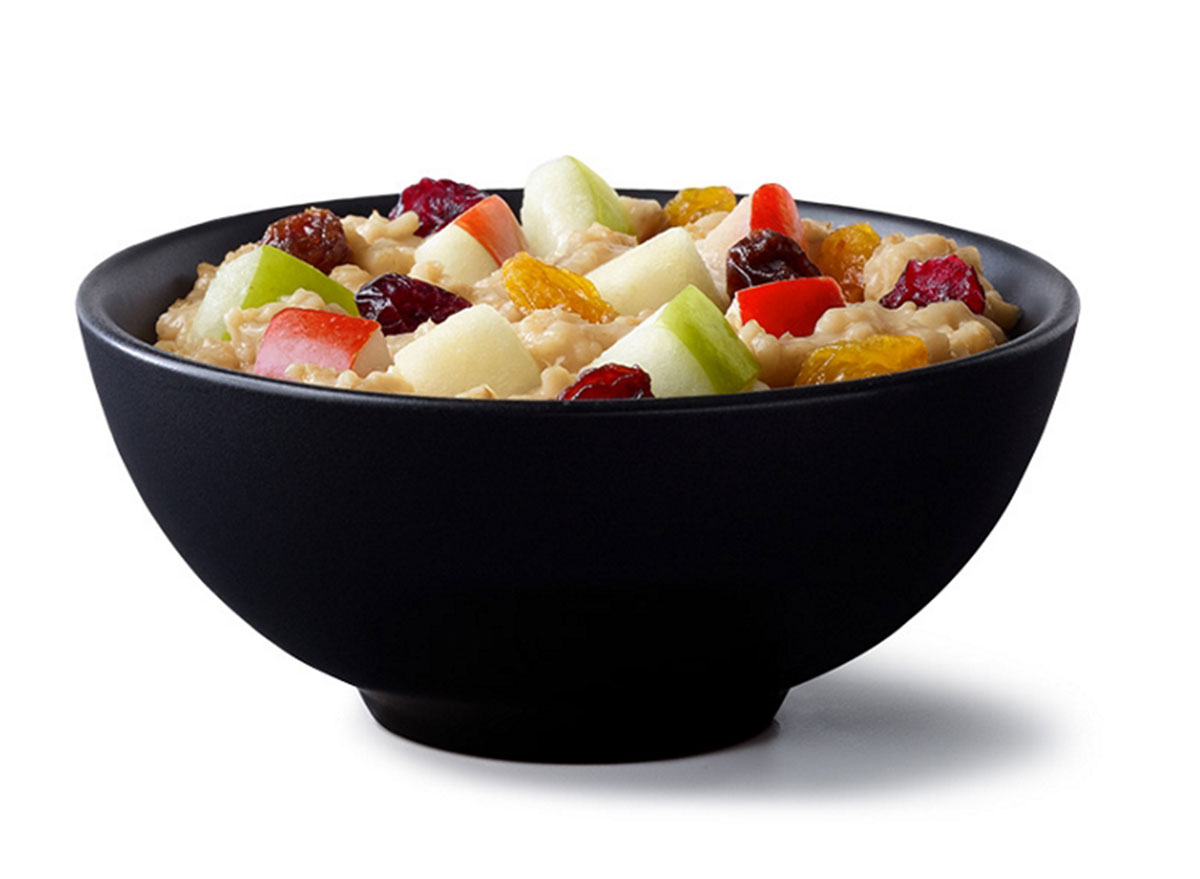
Per serving: 320 calories, 4.5 g fat (1.5 g saturated fat, 0 g trans fat), 150 mg sodium, 64 g carbs (4 g fiber, 31 g sugar), 6 g protein
One thing that is really hard to come by at most fast food restaurants is food that contains a decent amount of fiber. Thankfully, “this oatmeal provides you with 4 grams of fiber and 6 grams of protein to help you power through your morning without overdoing it on calories,” says Goodson. “And, not to mention, this is the lowest in saturated fat and sodium out of all of their breakfast options.”
The Worst Main Menu Items at McDonald’s
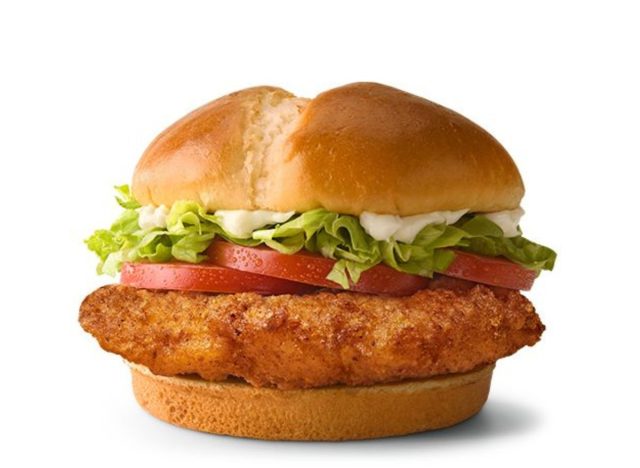
Per sandwich: 530 calories, 26 g fat (4 g saturated fat, 0 g trans fat), 1,050 mg sodium, 48 g carbs (2 g fiber, 9 g sugar), 27 g protein
Now that you have an understanding of the best and worst breakfast items at McDonald’s, we can take a look at their main menu. The only reason that the Deluxe McCrispy is one step further up on the list than the regular McCrispy is because this one comes with lettuce and tomato, so you’re getting a small boost of nutrients. Still, the levels of sodium are not ideal for a healthy meal.
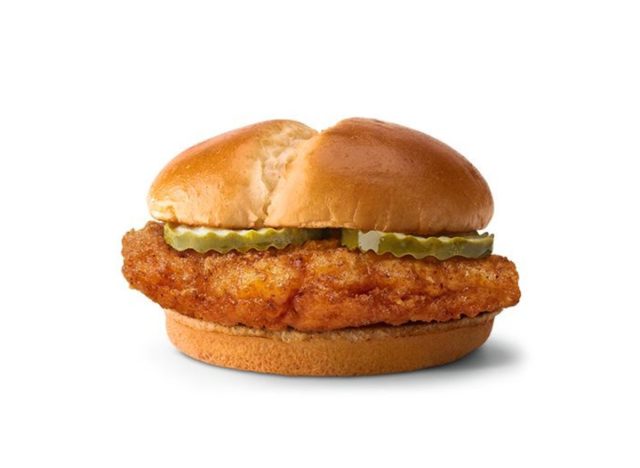
Per sandwich: 470 calories, 20 g fat (5 g saturated fat, 0 g trans fat), 1,140 mg sodium, 46 g carbs (1 g fiber, 9 g sugar), 26 g protein
This one may not seem too bad at first, but “Don’t be fooled because it’s a chicken sandwich,” says Tammy Lakatos Shames, RDN, CDN, CFT, and Lyssie Lakatos, RDN, CDN, CFT, also known as The Nutrition Twins. “You’ll swallow more than half of the daily recommended maximum of artery-clogging saturated fat.”
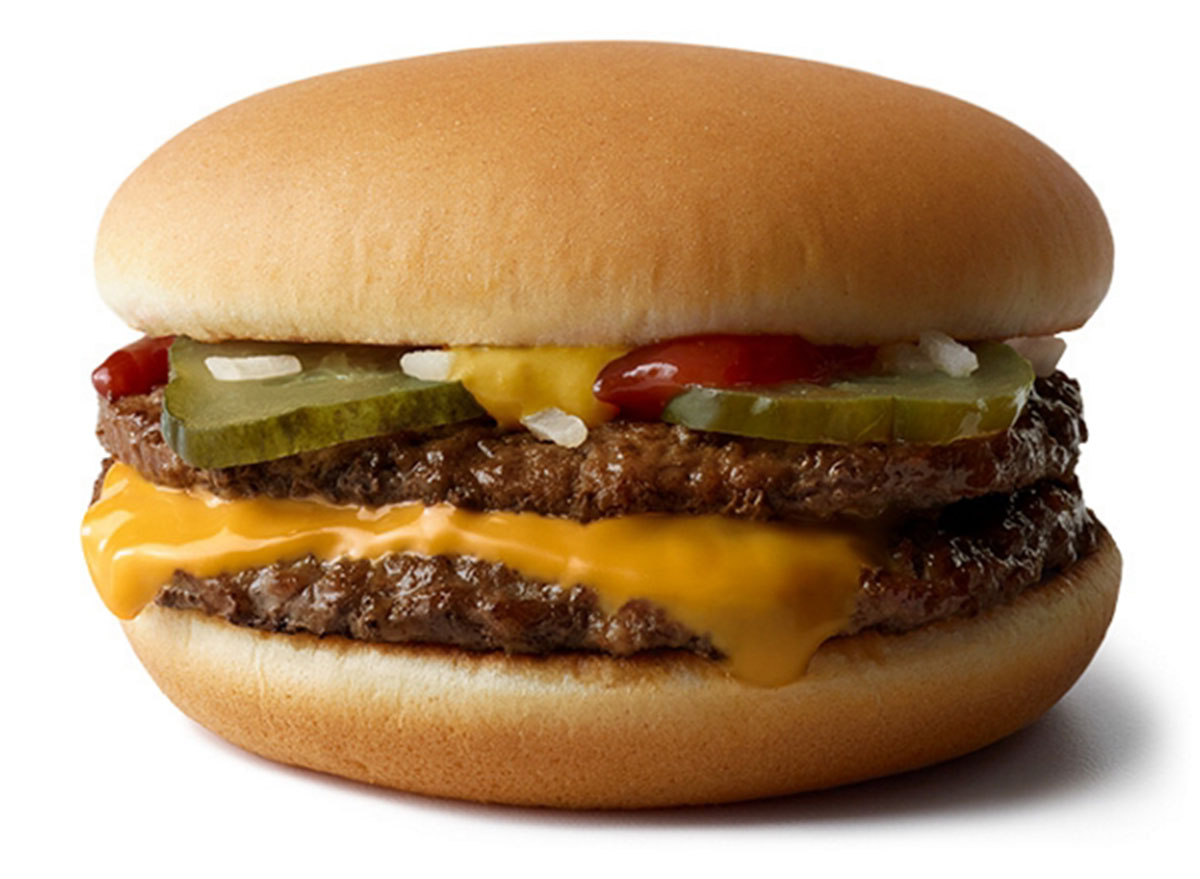
Per burger: 400 calories, 20 g fat (9 g saturated fat, 1 g trans fat), 920 mg sodium, 33 g carbs (2 g fiber, 7 g sugar), 22 g protein
The McDouble is one of the worst items on their list because of the 9 grams of saturated fat and over 900 milligrams of sodium. However, there are plenty of main menu burger items that are considered to be even more unhealthy than this one.
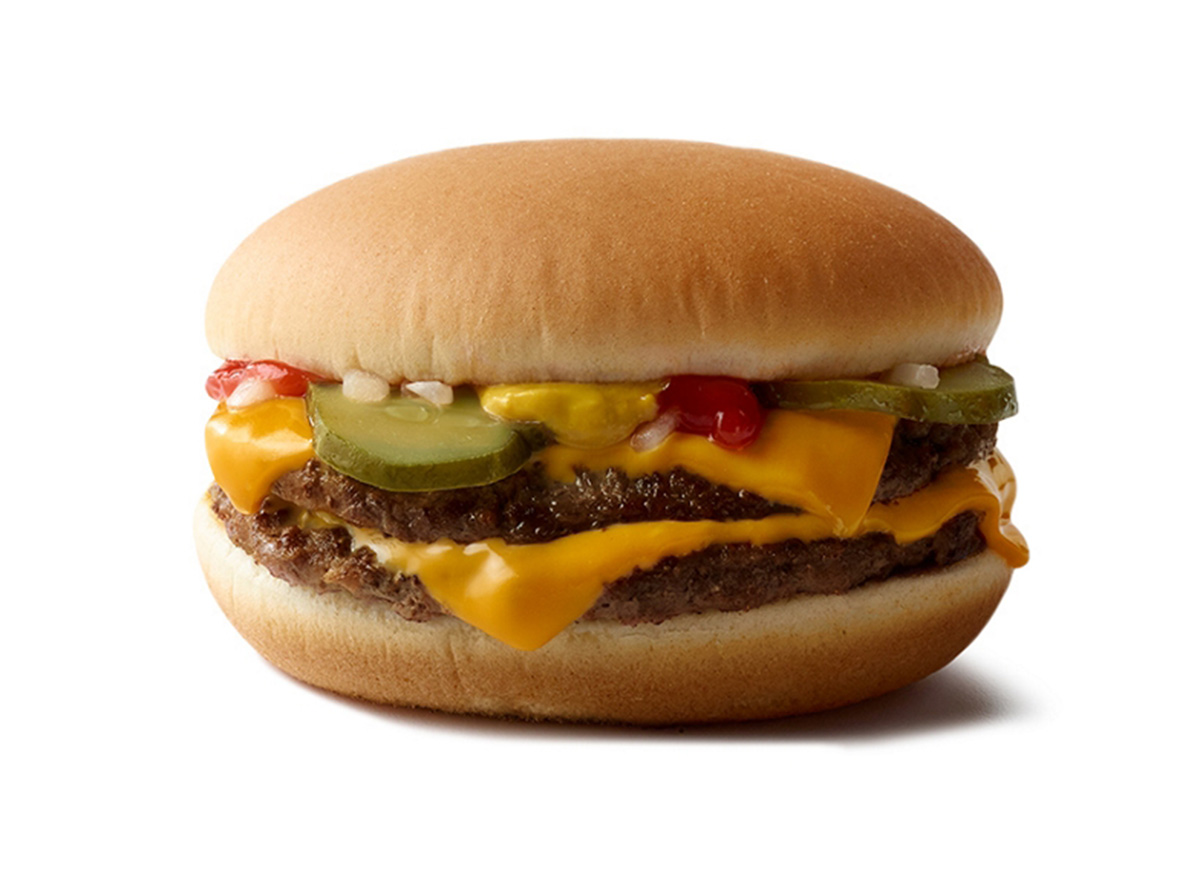
Per burger: 450 calories, 24 g fat (11 g saturated fat, 1.5 g trans fat), 1,120 mg sodium, 34 g carbs (2 g fiber, 7 g sugar), 25 g protein
If you’re craving a burger, you may want to opt for something other than the double cheeseburger. The two slices of cheese and two beef patties brings the saturated fat and sodium levels way up. Also, there are 1.5 grams of trans fats, and the World Health Organization suggests aiming for less than 2.2 grams per day if possible. That’s close to your entirely daily limit in just one sandwich.
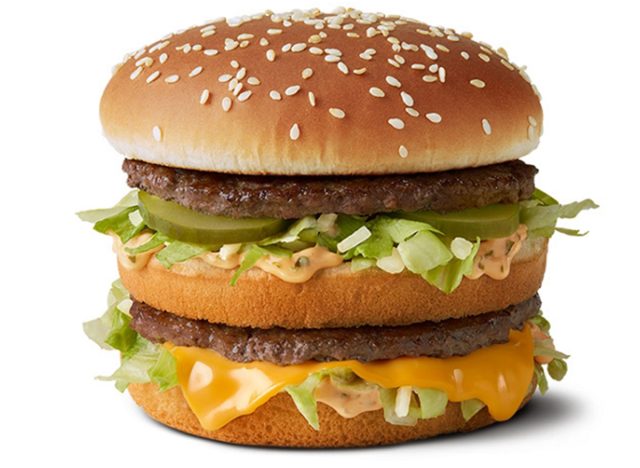
Per burger: 550 calories, 30 g fat (11 g saturated fat, 1 g trans fat), 1,010 mg sodium, 45 g carbs (3 g fiber, 9 g sugar), 25 g protein
It’s no surprise that the Big Mac would be on the list of worst main menu items, especially once you take a look at that extra piece of white bread in the middle of the burger. That plus cheese, two patties, and the Big Mac sauce bring this sandwich up to close to half your recommended sodium levels for one day, as well as almost all of your recommended saturated fat.
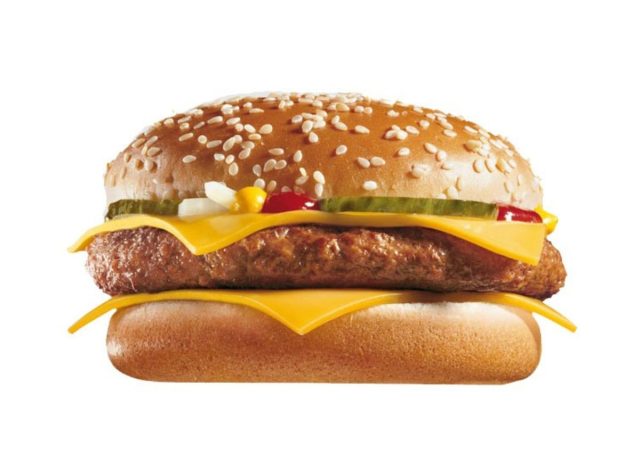
Per burger: 520 calories, 26 g fat (12 g saturated fat, 1.5 trans fat), 1,140 mg sodium, 42 g carbs (2 g fiber, 10 g sugar), 30 g protein
A Quarter Pounder With Cheese tastes delicious because of the larger beef patty and two slices of cheese, but these drool-worthy ingredients is what makes this option so unhealthy. At 26 grams of total fat and almost an entire day’s worth of saturated fat, it’s best to skip over this one entirely.
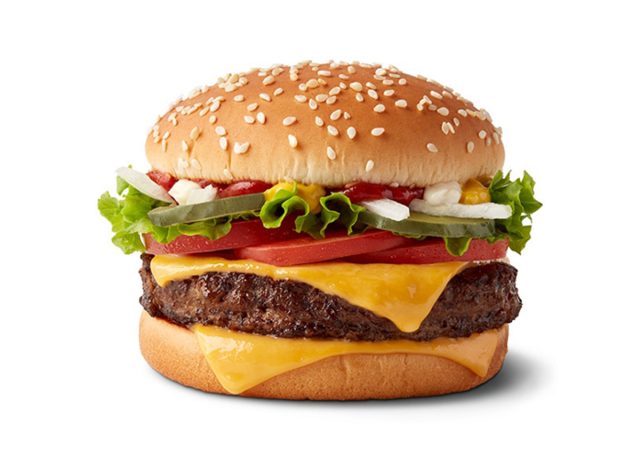
Per burger: 630 calories, 37 g fat (14 g saturated fat, 1.5 g trans fat), 1,210 mg sodium, 44 g carbs (3 g fiber, 11 g sugar), 30 g protein
The Quarter Pounder With Cheese Deluxe has more total fat, saturated fat, sodium, and sugar than the regular Quarter Pounder with Cheese. And with more saturated fat than is recommended to eat in one day, it’s best to choose a lighter burger option on the menu.
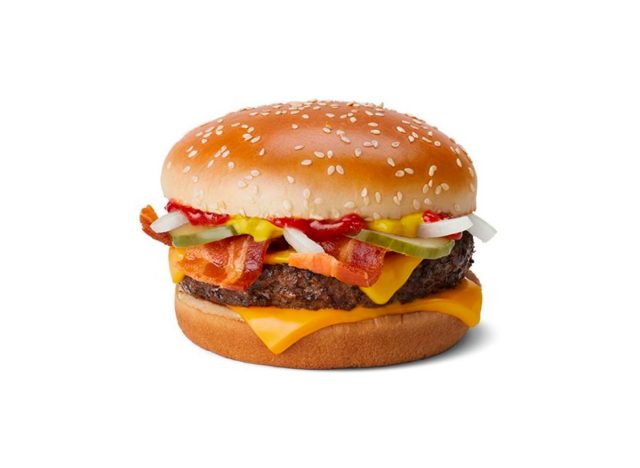
Per burger: 630 calories, 35 g fat (15 g saturated fat, 1.5 g trans fat), 1,470 mg sodium, 43 g carbs (3 g fiber, 10 g sugar), 36 g protein
What’s worse than a Quarter Pounder with Cheese? A Quarter Pounder with Cheese and Bacon. This burger packs in 35 grams of total fat, 15 grams of saturated fat, and almost 1,500 milligrams of sodium.
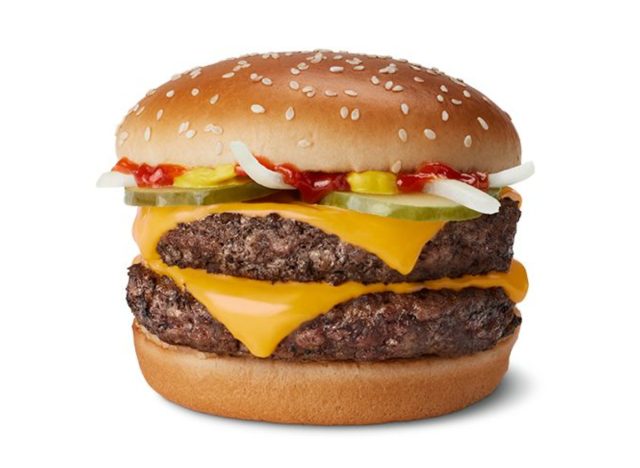
Per burger: 740 calories, 42 g fat (20 g saturated fat, 2.5 g trans fat), 1,360 mg sodium, 43 g carbs (2 g fiber, 10 g sugar), 48 g protein
“Let’s face it, double the meat and added cheese in this burger doesn’t exactly sound like the picture of health,” says the Nutrition Twins. “With 740 calories, you’re not far away from the calories that a small, inactive female needs for her entire day, yet you would have consumed 7 grams more than the daily saturated fat recommended by the AHA. This burger also has more trans fat (2.5 grams) then any other meal, which means it’s not good for the heart since it lowers good cholesterol and raises bad cholesterol.”
The Best Main Menu Items at McDonald’s
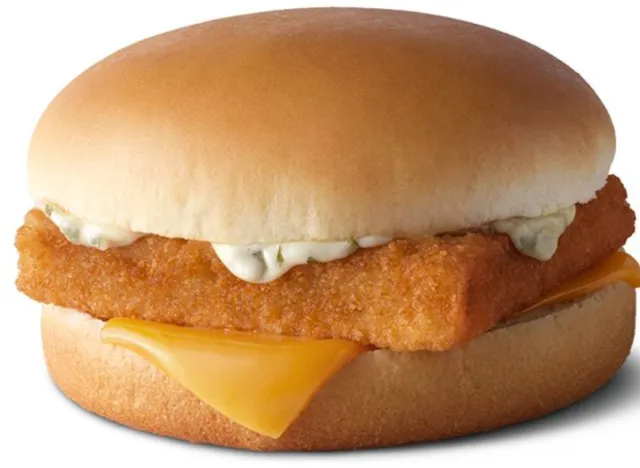
Per sandwich: 390 calories, 19 g fat (4 g saturated fat, 0 g trans fat), 560 sodium, 39 g carbs (2 g fiber, 5 g sugar), 16 g protein
The Filet-O-Fish may not have much nutritional value since it has no lettuce or veggies, it is lower in saturated fat and sodium than many of the main menu items. Plus, it’s under 400 calories.
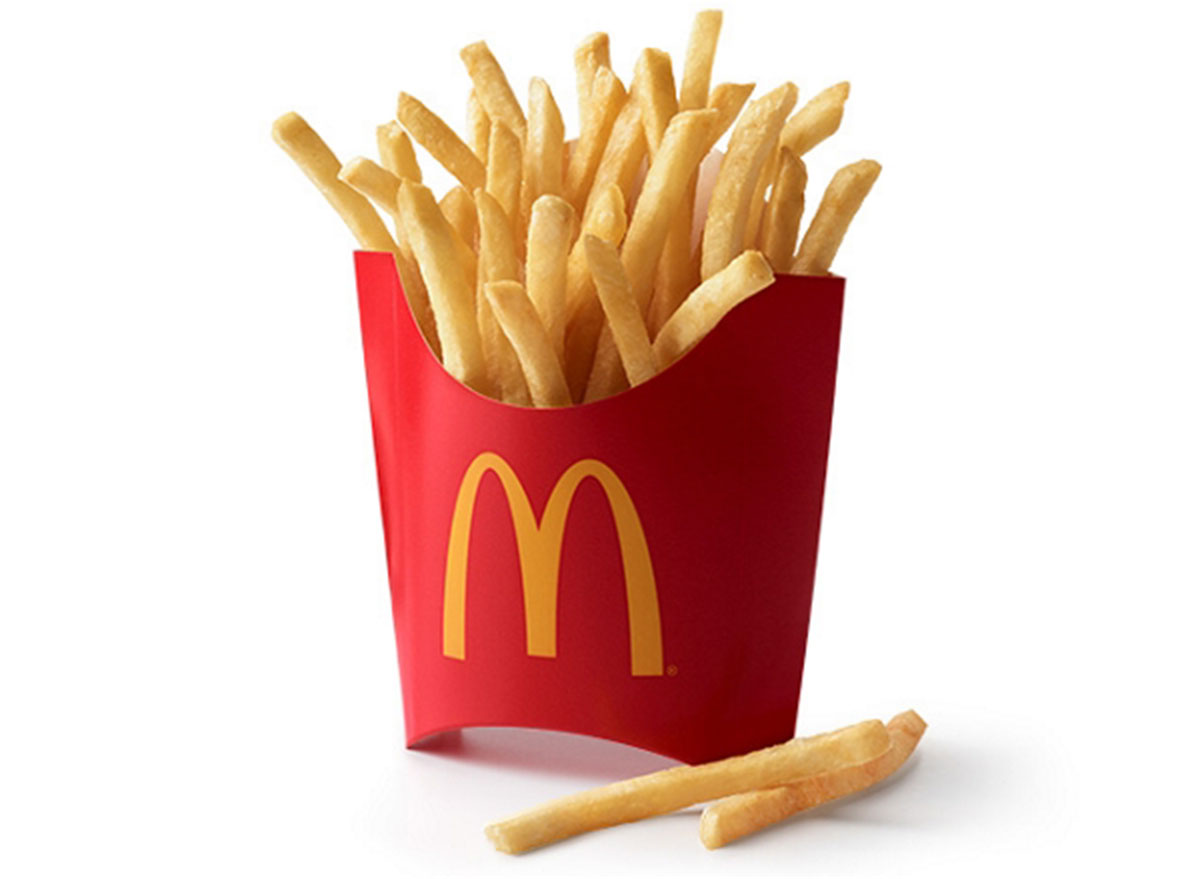
Per medium: 320 calories, 15 g fat (2 g saturated fat, 0 g trans fat), 260 mg sodium, 43 g carbs (4 g fiber, 0 g sugar), 5 g protein
The famous McDonald’s Fries are lower in calories, total fat, saturated fat, sodium, and carbs than many items on their menu. However, these won’t fill you up and don’t provide you with a full, balanced meal, which means you’ll raise these levels as soon as you pair them with something else from the menu.
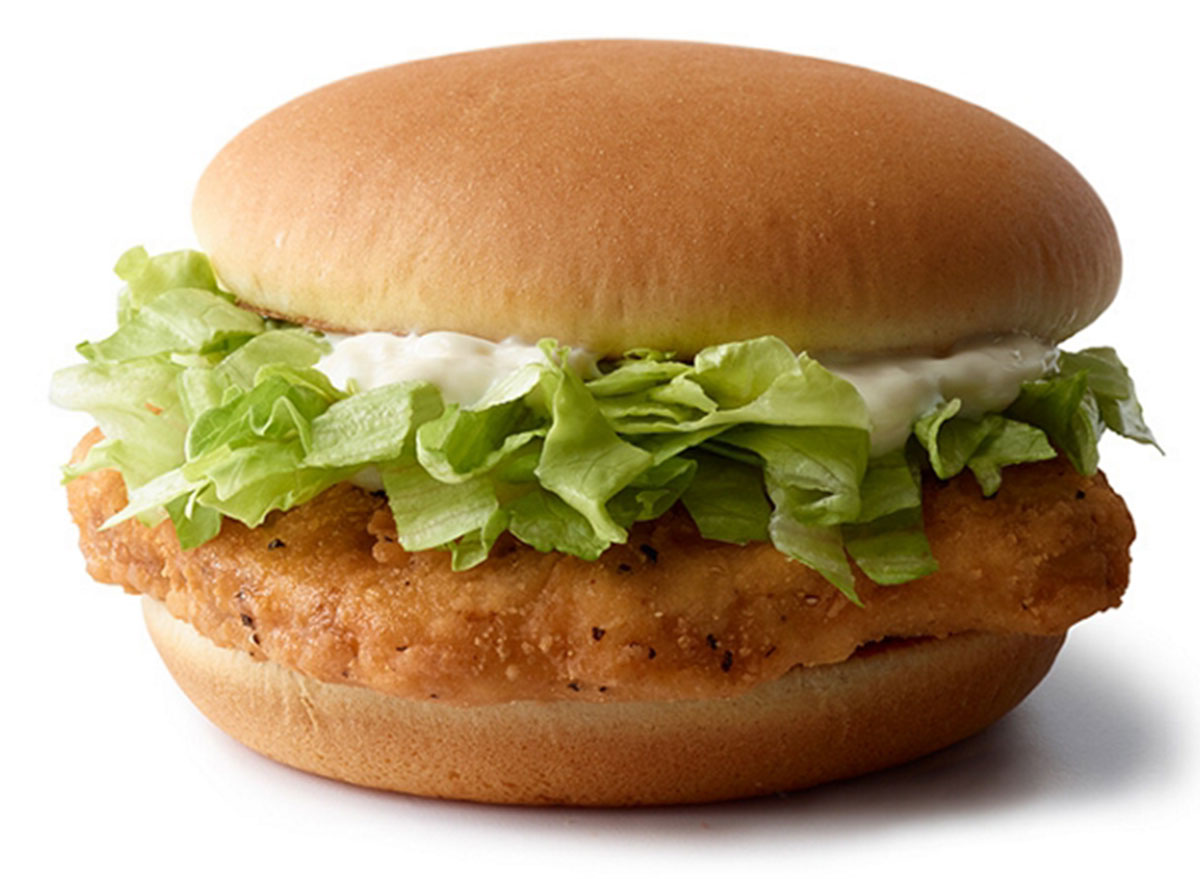
Per sandwich: 400 calories, 21 g fat (3.5 g saturated fat, 0 g trans fat), 560 mg sodium, 39 g carbs (1 g fiber, 5 g sugar), 14 g protein
The classic McChicken is lower in calories, total fat, saturated fat, and has about half of the sodium as the McCrispy. So, if you’re in the mood for a chicken sandwich, this one is your best option.
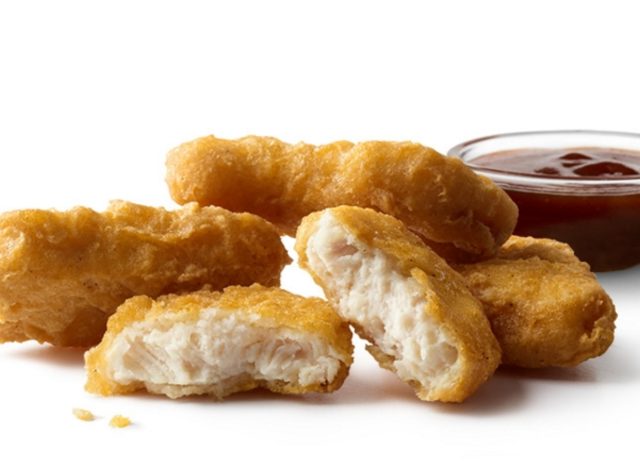
Per 6-piece serving: 250 calories, 15 g fat (2.5 g saturated fat, 0 g trans fat), 500 mg sodium, 15 g carbs (1 g fiber, 0 g sugar), 14 g protein
“Chicken nuggets tend to be a decadent-feeling option, yet you get 13 grams of satisfying protein and less than one-quarter of your saturated fat allotment, which is far better than most other items on the menu,” say the Nutrition Twins. “Plus, at only 280 calories, you can step up the nutrition by adding apples and still have far fewer calories than most other items on the menu.”
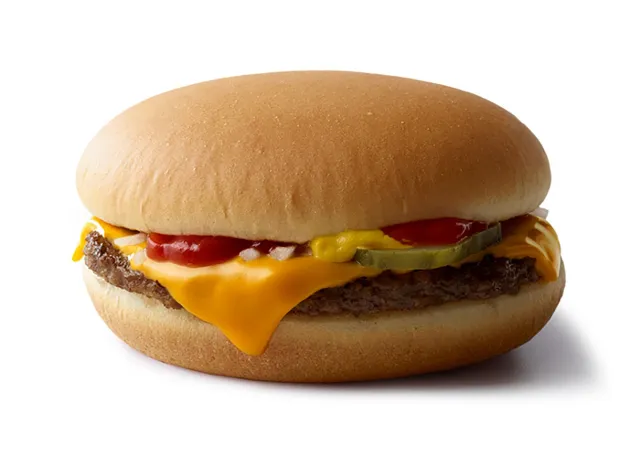
Per burger: 300 calories, 13 g fat (6 g saturated fat, 0.5 g trans fat), 720 mg sodium, 32 g carbs (2 g fiber, 7 g sugar), 15 g protein
It can be tempting to go for the enormous cheeseburgers on the list like the Quarter Pounder With Cheese, but opting instead for a regular McDonald’s Cheeseburger can satisfy the cravings you feel while not sending you over the edge on saturated fat, calories, sodium, or fat.
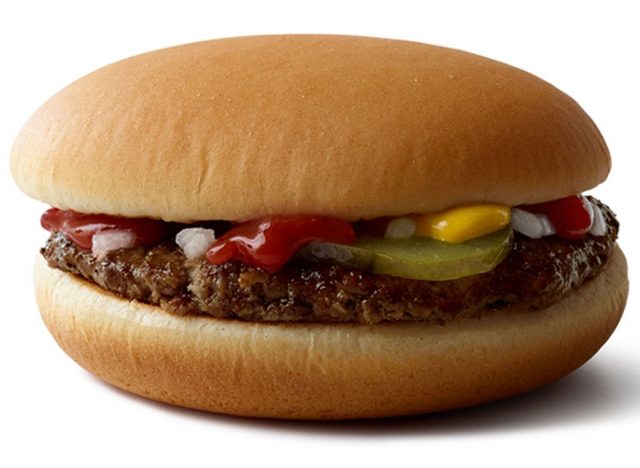
Per burger: 250 calories, 9 g fat (3.5 g saturated fat, 0 g trans fat), 510 mg sodium, 31 g carbs (1 g fiber, 6 g sugar), 12 g protein
“This hamburger tops the list of best items when it comes calories, saturated fat, and sodium,” says the Nutrition Twins. “Add apple slices or a healthy side from your own house or car to step up the fiber, antioxidants and nutrients.”
The Twins add that “this burger’s biggest shortcoming is that it only contains 12 grams of protein, and you want to aim for at least 20 grams of protein per meal.”
The Worst Coffee Items at McDonald’s
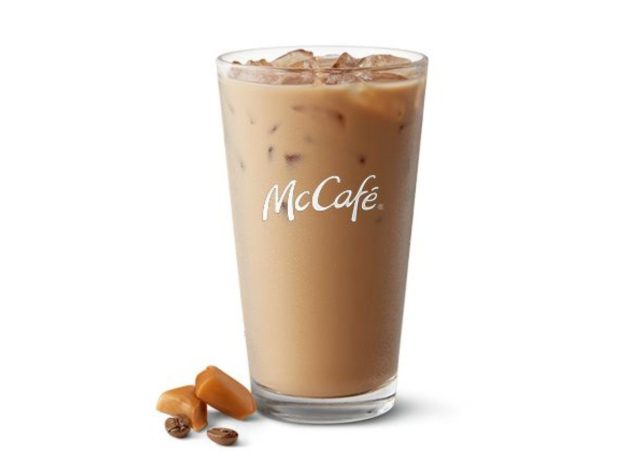
Per small drink: 140 calories, 5 g fat (3.5 g saturated fat), 220 mg sodium, 23 g carbs (0 g fiber, 20 g sugar), 3 g protein
McDonald’s offers up an extensive coffee menu, but many of the drinks are just added sugar bombs. This Iced Caramel Coffee has 20 grams of sugar, which is a lot for just one coffee drink—especially because the Dietary Guidelines for Americans 2020–2025 recommend around 50 grams or less of added sugar daily. Although 20 is a lot for one beverage, there are plenty of drinks on the menu with even more added sugar.
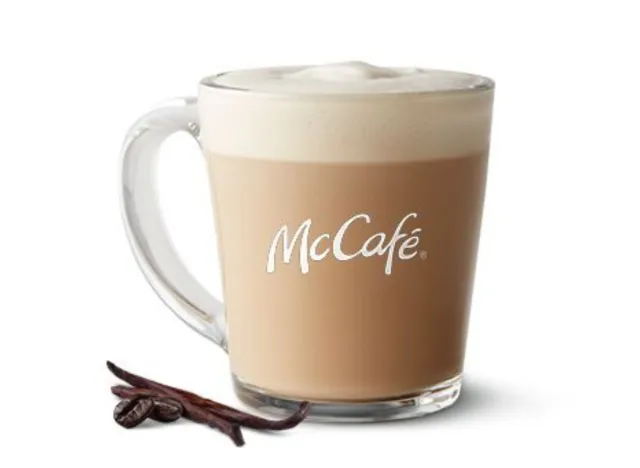
Per small drink: 210 calories, 4.5 g fat (3 g saturated fat), 65 mg sodium, 37 g carbs (0 g fiber, 28 g sugar), 5 g protein
With 28 grams of sugar and no fiber, you may want to pass on the French Vanilla Cappuccino. If you do choose this one, it’s a good idea to leave it as a once-in-a-while treat.
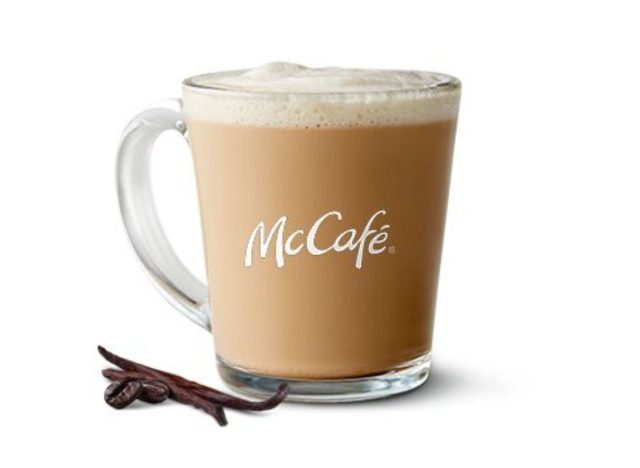
Per small drink: 250 calories, 6 g fat (4 g saturated fat), 90 mg sodium, 39 g carbs (0 g fiber, 29 g sugar), 8 g protein
The French Vanilla Latte is almost identical in nutrition to its cappuccino counterpart, but it’s just slightly higher in sugar, saturated fat, and sodium. The bigger difference between these drinks is in the foam, with a cappuccino containing heavier foam than the latte.
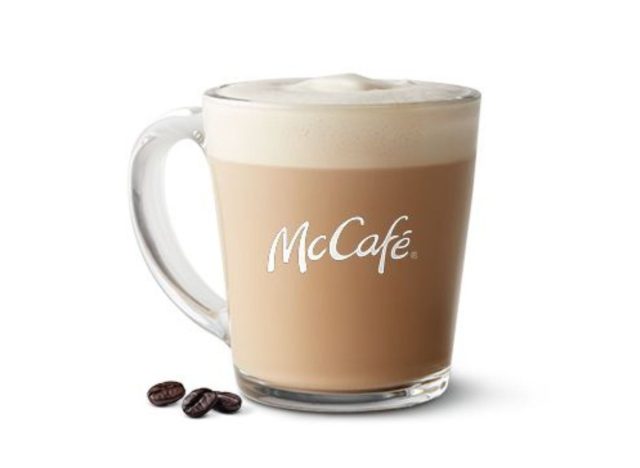
Per small drink: 210 calories, 4.5 g fat (3 g saturated fat), 290 mg sodium, 35 g carbs (0 g fiber, 31 g sugar), 7 g protein
The Caramel Cappuccino has even more sugar than the French Vanilla, and this one has a lot more sodium as well. The only plus side to this beverage is that it does have 7 grams of protein from the whole milk.
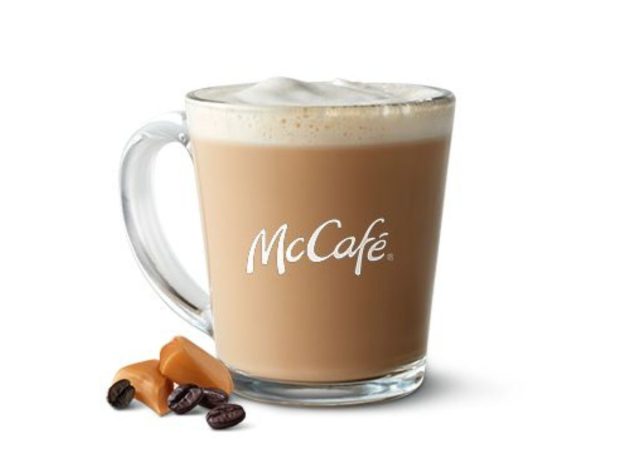
Per small drink: 250 calories, 7 g fat (4 g saturated fat), 320 mg sodium, 39 g carbs (0 g fiber, 34 g sugar), 9 g protein
In the same way that the French Vanilla Latte has more calories and sugar than the cappuccino, the Caramel Latte is slightly worse in nutrition than the Caramel Cappuccino.
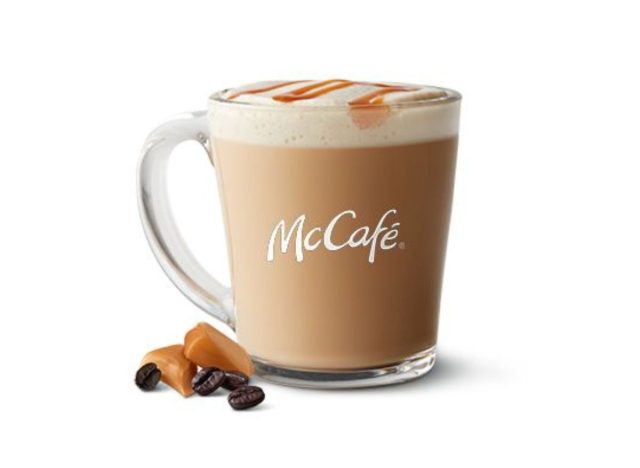
Per small drink: 260 calories, 6 g fat (4 g saturated fat), 320 mg sodium, 41 g carbs (0 g fiber, 35 g sugar), 9 g protein
The Caramel Macchiato is similar to a latte, but with added caramel drizzle. This may be a delicious addition, but it isn’t doing your sugar or fat intake any favors.
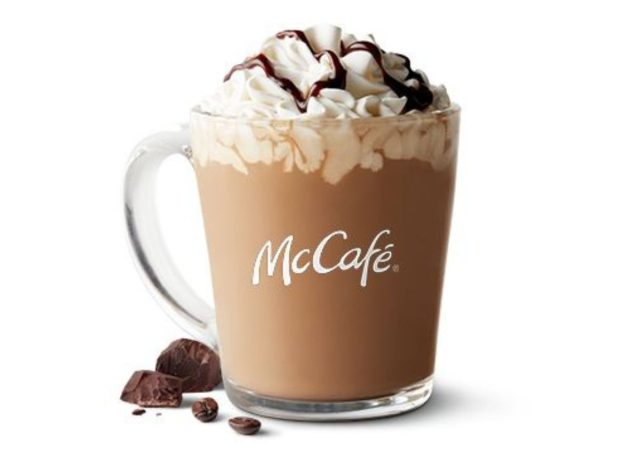
Per small drink: 290 calories, 9 g fat (5 g saturated fat), 125 mg sodium, 45 g carbs (1 g fiber, 39 g sugar), 8 g protein
A Mocha Latte is warm, sweet, and comforting, but there’s nothing cozy about 39 grams of sugar in a small-size drink. You’re better off getting a regular latte and asking for a little bit of mocha drizzle instead.
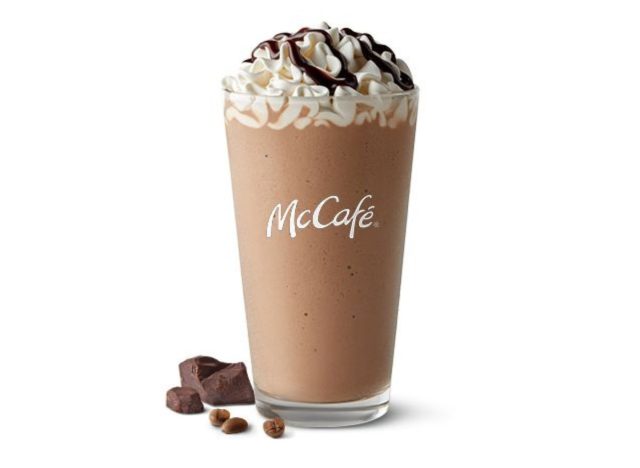
Per small drink: 430 calories, 17 g fat (11 g saturated fat), 120 mg sodium, 61 g carbs (1 g fiber, 51 g sugar), 7 g protein
The McDonald’s Frappe may taste good, but with 51 grams of sugar in a small Mocha Frappe, this drink isn’t cutting it in the nutrition department. It’s fine if you’re craving one, but try consuming it only in moderation if possible.
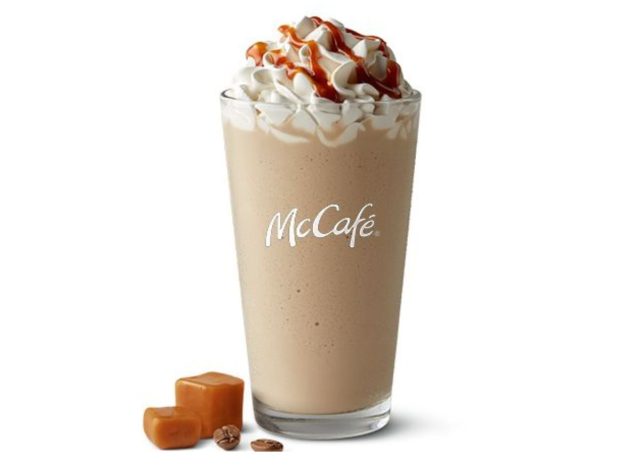
Per small drink: 420 calories, 17 g fat (11 g saturated fat), 80 mg sodium, 60 g carbs (1 g fiber, 53 g sugar), 7 g protein
Even worse than the Mocha Frappe is the caramel-flavored choice. With 53 grams of sugar, you risk spiking your blood sugar and craving more sugar later on.
The Best Coffee Items at McDonald’s
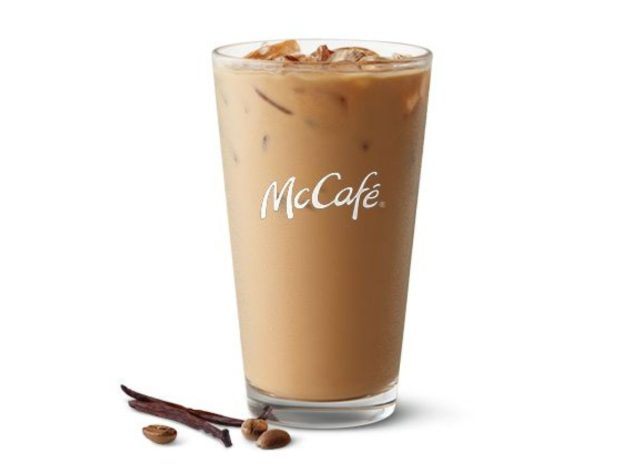
Per small drink: 140 calories, 5 g fat (3 g saturated fat), 40 mg sodium, 24 g carbs (0 g fiber, 16 g sugar), 2 g protein
For those who are in the mood for a creamy, sweet iced coffee drink, the Iced French Vanilla Coffee is fairly middle-of-the-road when it comes to nutrition. It has less sugar and fat than a vanilla latte, but it has less protein as well.
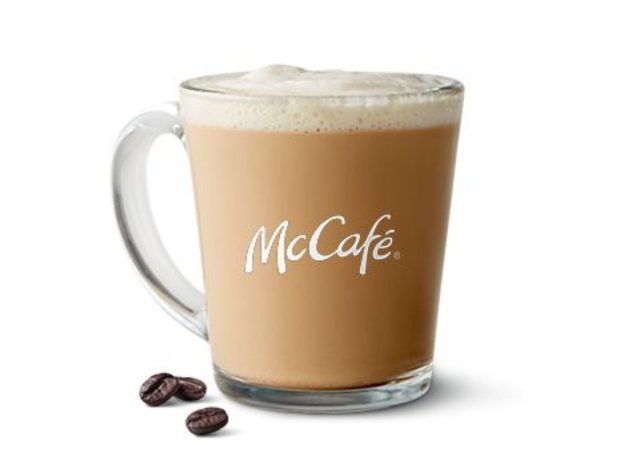
Per small drink: 140 calories, 8 g fat (4.5 g saturated fat), 100 mg sodium, 12 g carbs (0 g fiber, 11 g sugar), 7 g protein
Ordering a regular Latte without flavoring can satisfy your cravings for a milky coffee drink without as much sugar. You’ll still get 11 grams of sugar from the milk, but you won’t have the extra added sugars from a sugary syrup.
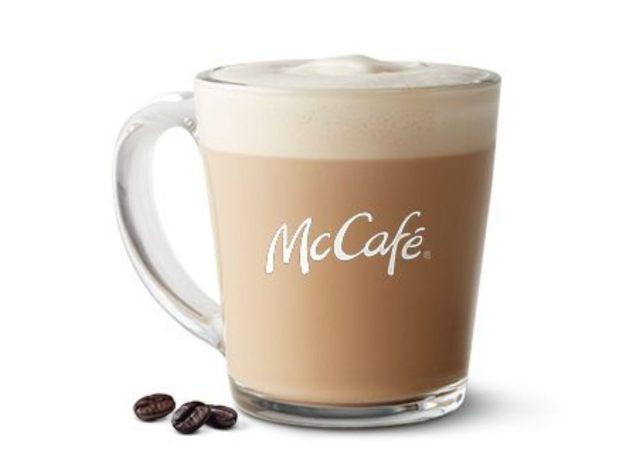
Per small drink: 110 calories, 5 g fat (3.5 g saturated fat), 75 mg sodium, 10 g carbs (0 g fiber, 8 g sugar), 6 g protein
The McCafé Cappuccino is similar to the latte in nutritional value, but you’ll consume less sugar with this one because the majority of the milk is foamed—meaning there’s less of it.
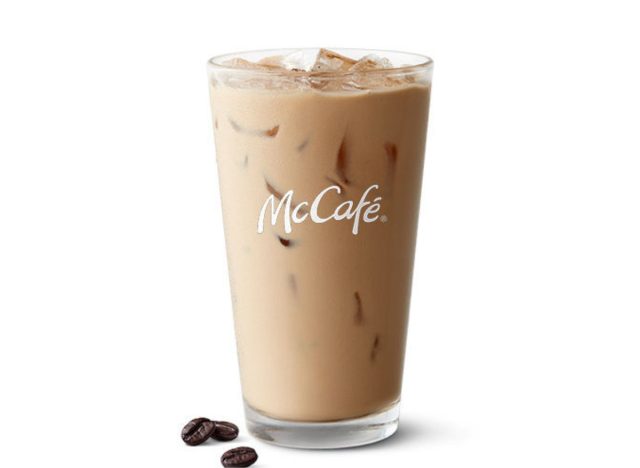
Per small drink: 90 calories, 4.5 g fat (2.5 g saturated fat), 65 mg sodium, 7 g carbs (0 g fiber, 7 g sugar), 4 g protein
On a hotter day when you’re craving something iced, the plain McCafé Iced Latte is a healthier option than the Frappes or flavored lattes.
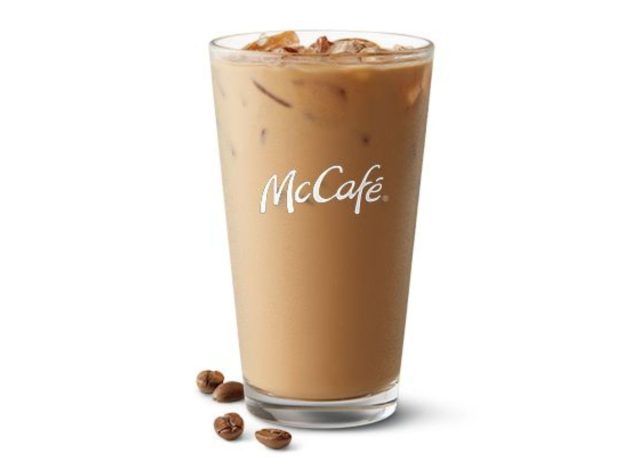
Per small drink: 140 calories, 5 g fat (3.5 g saturated fat), 50 mg sodium, 24 g carbs (0 g fiber, 7 g sugar), 2 g protein
The McCafé Iced Coffee and the Iced Latte are almost identical in nutritional value, so it comes down to what your flavor preferences are. A latte is going to be made with espresso and milk, and an iced coffee is made with brewed coffee and milk.
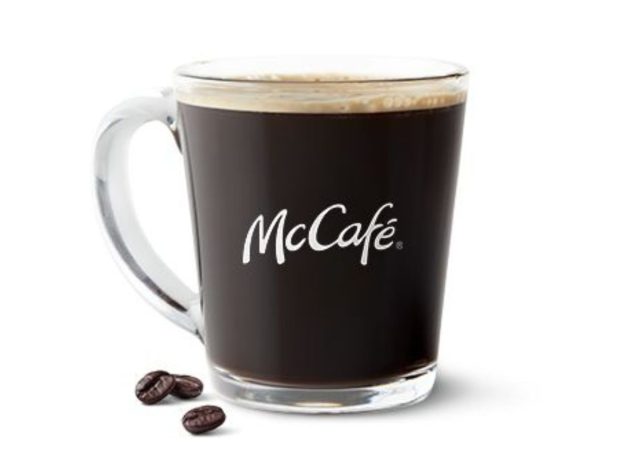
Per small drink: 5 calories, 0 g fat (0 g saturated fat), 10 mg sodium, 1 g carbs (0 g fiber, 0 g sugar), 0 g protein
An Americano is just espresso and hot water, so drinking this beverage black will help limit your sugar, calories, and fat. If you’re in need of a caffeine boost and also enjoy the actual taste of coffee, try ordering yourself one of these.
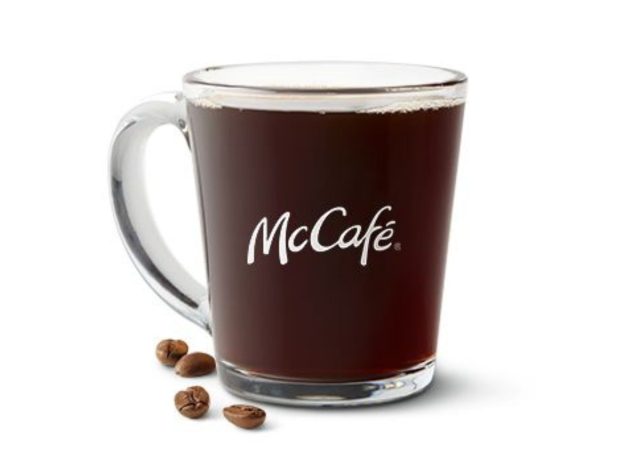
Per small drink: 5 calories, 0 g fat (0 g saturated fat), 10 mg sodium, 1 g carbs (0 g fiber, 0 g sugar), 0 g protein
A small black coffee at McDonald’s is one of the best choices you can make when it comes to healthy caffeinated drinks. Even if you add in a small amount of cream and sugar, you’ll likely fair better than if you were to drink one of their sugary, flavored lattes.
The Worst Desserts & Shakes at McDonald’s
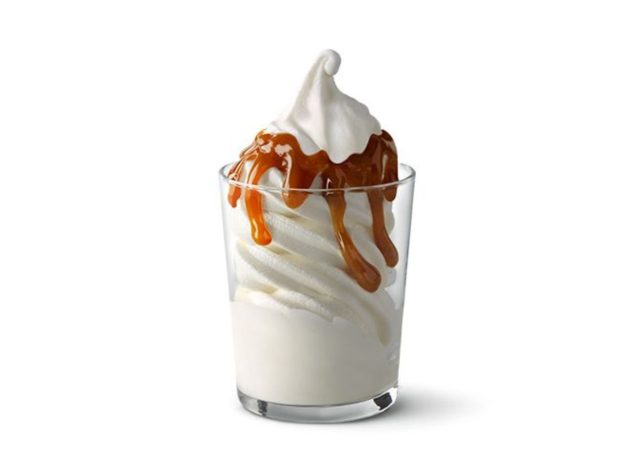
Per sundae: 330 calories, 7 g fat (4.5 g saturated fat, 0 g trans fat), 150 mg sodium, 58 g carbs (0 g fiber, 41 g sugar), 7 g protein
It’s safe to say that when you’re ordering a dessert—especially from a fast food joint like McDonald’s—you’re probably not expecting to find a healthy choice. And we’ll be honest, none of the items on their dessert menu are “healthy.” However, some are far worse in nutritional value than others. For example, the Hot Caramel Sundae yields 41 grams of sugar per serving, which is a ton of sugar to have in one sitting.
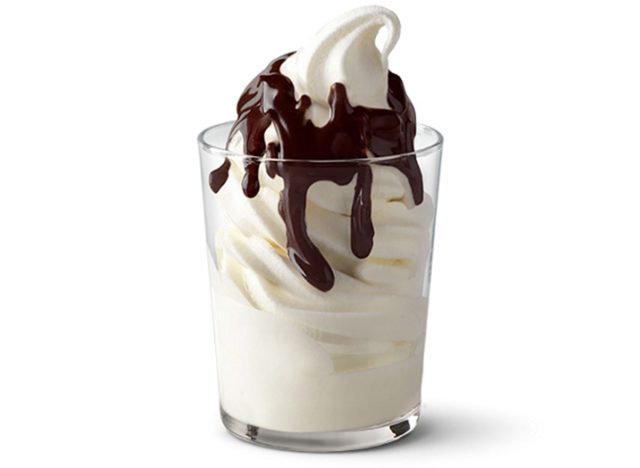
Per sundae: 330 calories, 10 g fat (7 g saturated fat, 0 g trans fat), 170 mg sodium, 51 g carbs (2 g fiber, 44 g sugar), 8 g protein
The Hot Fudge Sundae has even more sugar than the caramel option, making it slightly worse. It’s okay to enjoy these from time to time of course, but you may not want to get in the habit of ordering one every time.
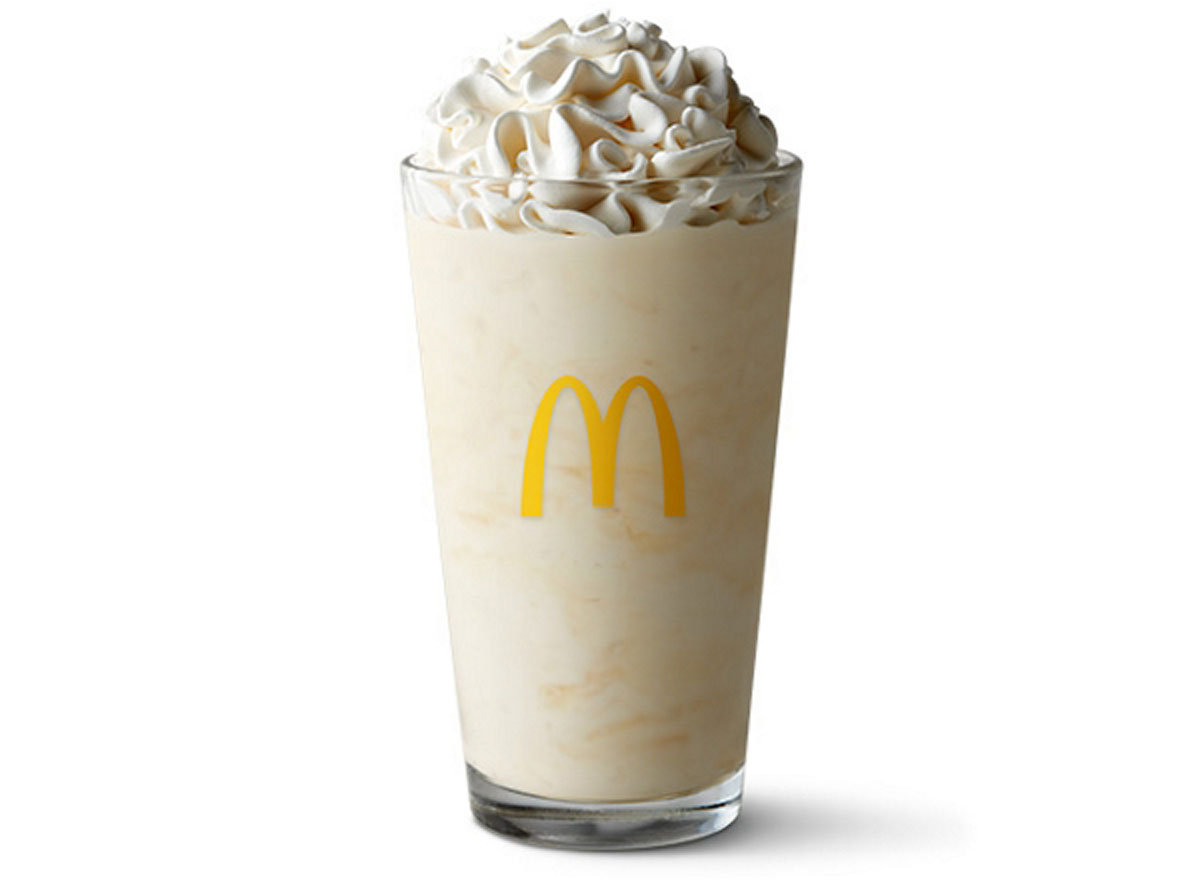
Per small shake: 480 calories, 13 g fat (8 g saturated fat, 0.5 g trans fat), 210 mg sodium, 80 g carbs (0 g fiber, 51 g sugar), 10 g protein
With almost 500 calories, 8 grams of saturated fat and a whopping 51 grams of sugar, the Vanilla Shake is a beast of a dessert. Not to mention the total calories, fat, and sugar you’ll consume if you pair this with other McDonald’s food items.
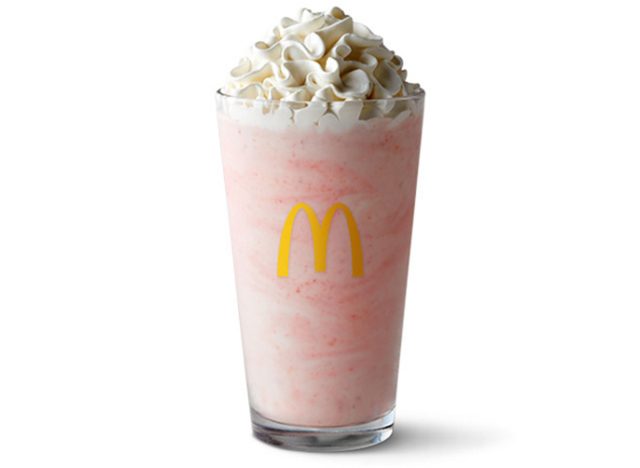
Per small shake: 470 calories, 13 g fat (8 g saturated fat, 0.5 g trans fat), 160 mg sodium, 77 g carbs (0 g fiber, 58 g sugar), 10 g protein
“A Strawberry Shake from McDonald’s is another fan favorite,” says Trista Best, MPH, RD, LD at Balance One Supplements. However, a small size has a whopping 58 grams of sugar. According to Best, “Consuming excessive amounts of added sugar can lead to weight gain, tooth decay, and an increased risk of chronic diseases such as diabetes, heart disease, and certain cancers.”
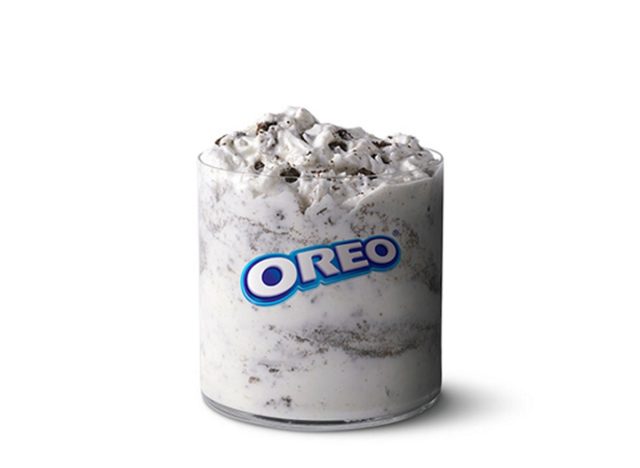
Per regular: 510 calories, 16 g fat (8 g saturated fat, 0.5 trans fat), 260 mg sodium, 80 g carbs (1 g fiber, 60 g sugar), 12 g protein
McDonald’s McFlurries are quite famous, and it’s for good reason. These delicious treats are sweet, ice cold, and creamy, but an Oreo McFlurry has 60 grams of sugar per serving, and that’s more than twice as much as something like a serving of Häagan-Dazs Vanilla Ice Cream.
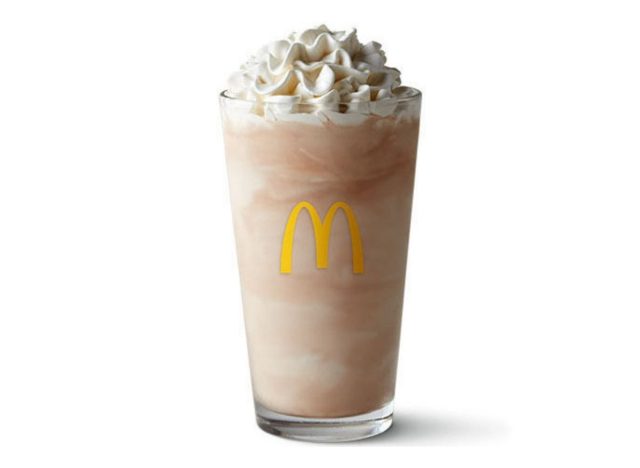
Per small shake: 520 calories, 14 g fat (9 g saturated fat, 0.5 g trans fat), 250 mg sodium, 85 g carbs (1 g fiber, 74 g sugar), 12 g protein
The Chocolate Shake has more sugar, total fat, and saturated fat than the vanilla or strawberry shakes, the Oreo McFlurry, and both sundae options, which makes this one of the worst McDonald’s dessert options on the menu.
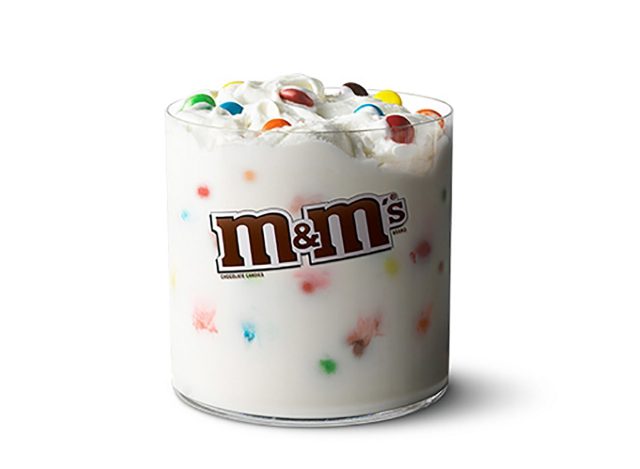
Per regular: 640 calories, 21 g fat (14 g saturated fat, 0.5 trans fat), 200 mg sodium, 96 g carbs (2 g fiber, 83 g sugar), 13 g protein
With more sugar and saturated fat than any of the dessert items at McDonald’s, the McFlurry with M&M’s is by far the unhealthiest option you can choose. If you’re craving ice cream, you can opt for something like the Vanilla Cone instead.
The Best Desserts & Shakes on the McDonald’s Menu

Per cone: 200 calories, 5 g fat (3 g saturated fat, 0 g trans fat), 80 mg sodium, 33 g carbs (0 g fiber, 23 g sugar), 5 g protein
For a dessert item, the Vanilla Cone isn’t terrible in the nutrition department. “When compared to other items on the dessert menu, this simple ice cream cone is lower in saturated fat and added sugars,” says registered dietitian nutritionist Sydney Greene MS, RDN. “It also contains roughly 15% of the recommended daily value of calcium that an average adult should consume in a day.”
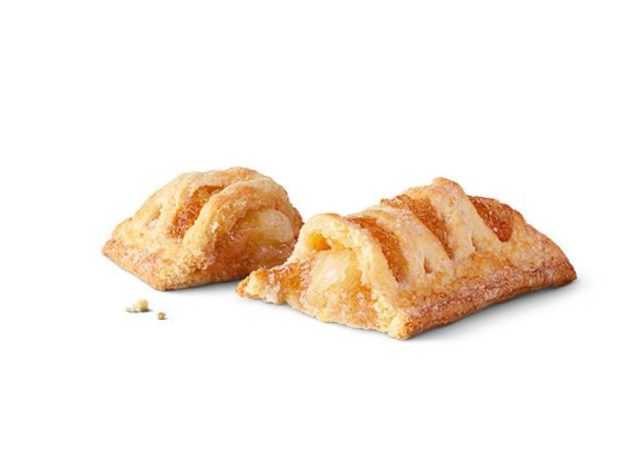
Per 230 calories, 11 g fat (6 g saturated fat, 0 g trans fat), 100 mg sodium, 33 g carbs (2 g fiber, 15 g sugar), 2 g protein
If you’re looking for a post-meal sweet treat that you can easily take on the go that also won’t break your health goals, the Baked Apple Pie is a great option. “This dessert has four grams of fiber and only 13 grams of sugar, which is less sugar than some breakfast cereals and yogurt on supermarket aisles today,” says Greene.
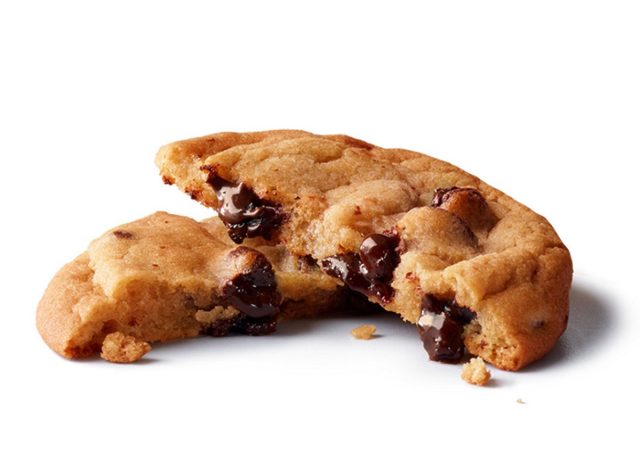
Per cookie: 170 calories, 8 g fat (4 g saturated fat, 0 g trans fat), 95 mg sodium, 22 g carbs (1 g fiber, 15 g sugar), 2 g protein
Last, but certainly not least, McDonald’s offers a warm, gooey chocolate chip cookie that is fairly reasonable when it comes to calories, fat, and sugar. “For anyone paying attention to their caloric intake, the chocolate chip cookie has the least amount of calories on the dessert menu, and though it is not a significant amount, one cookie does contain one gram of fiber, and when it comes to fiber intake, every gram counts,” says Greene.


